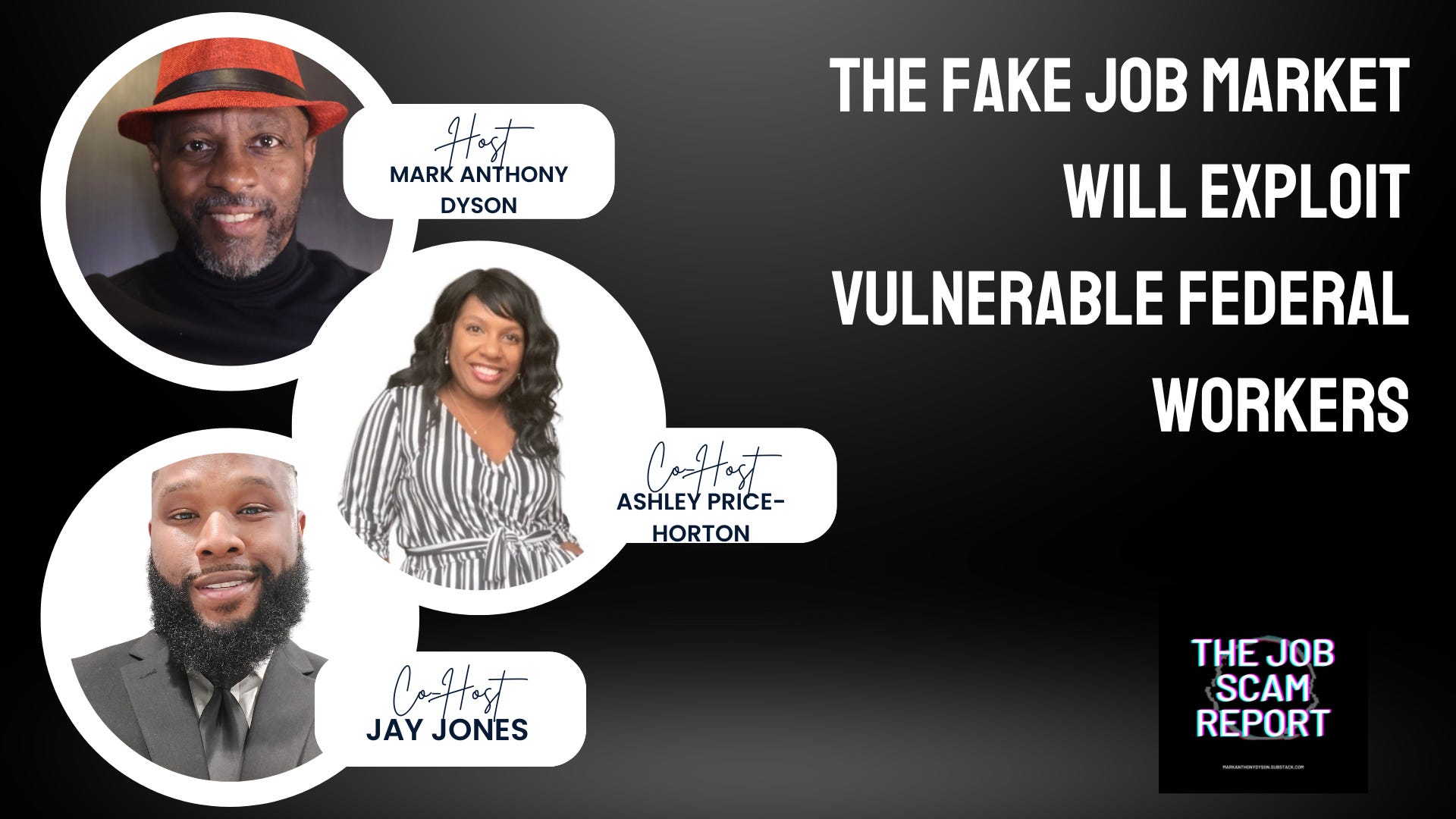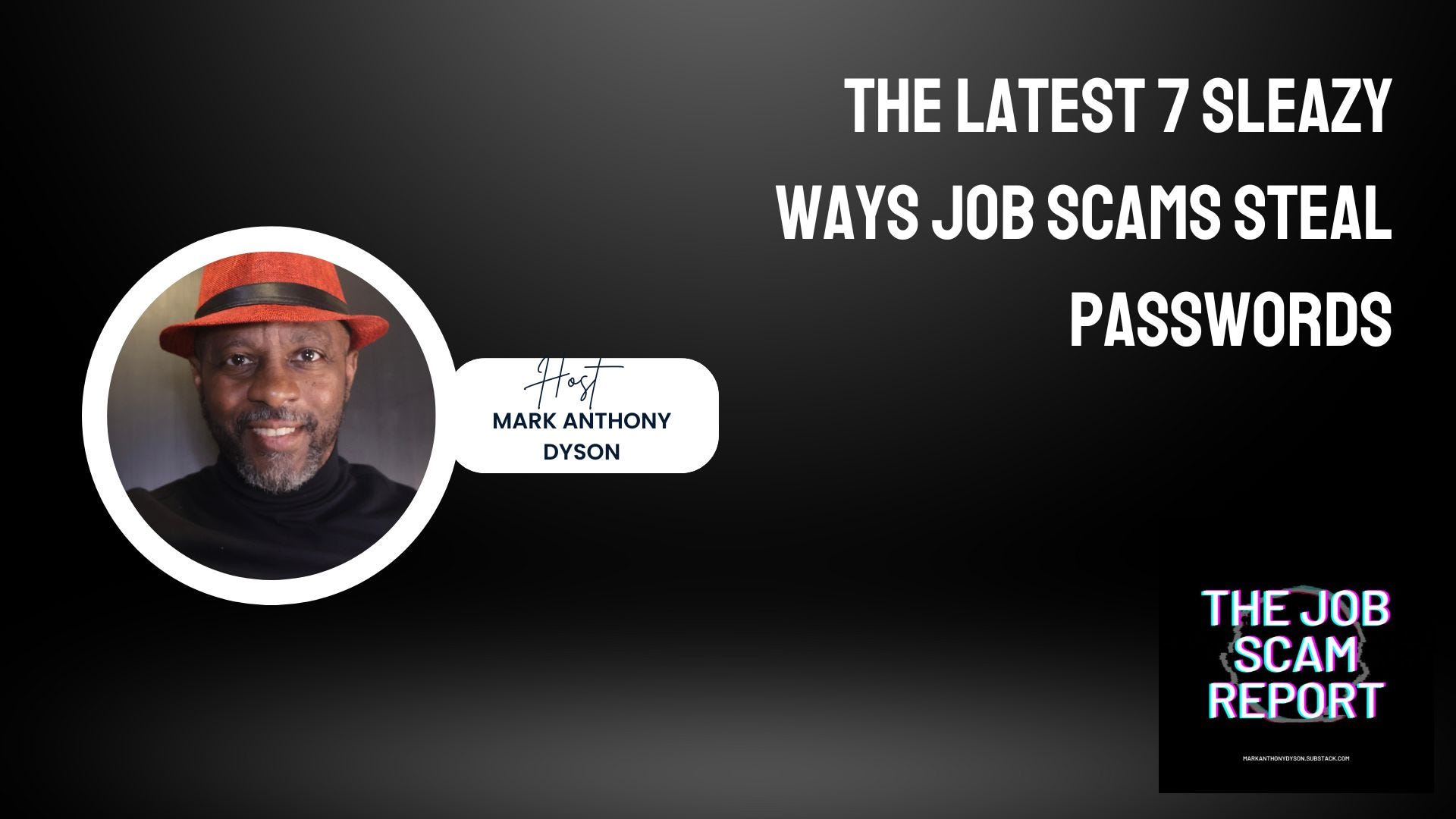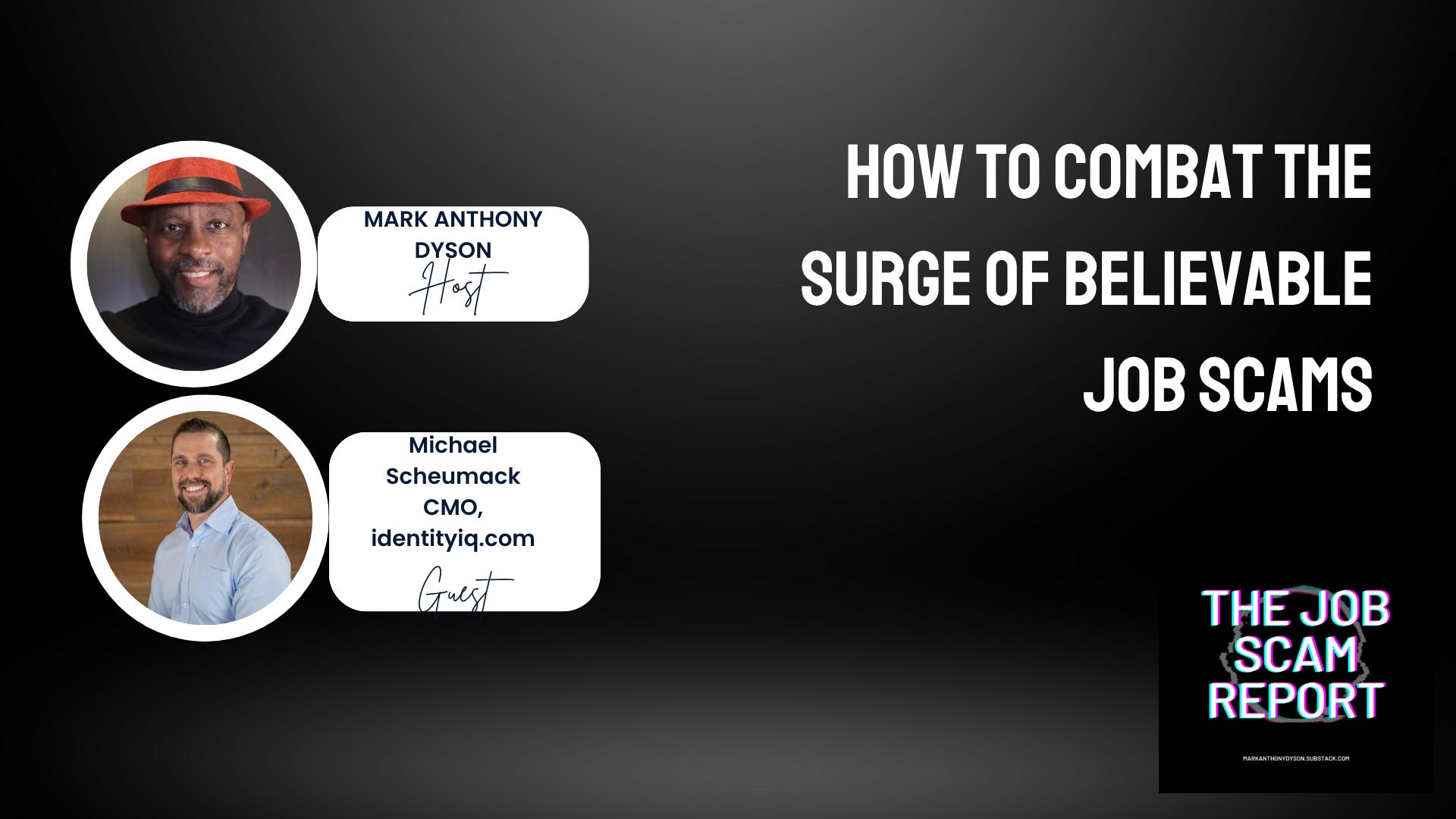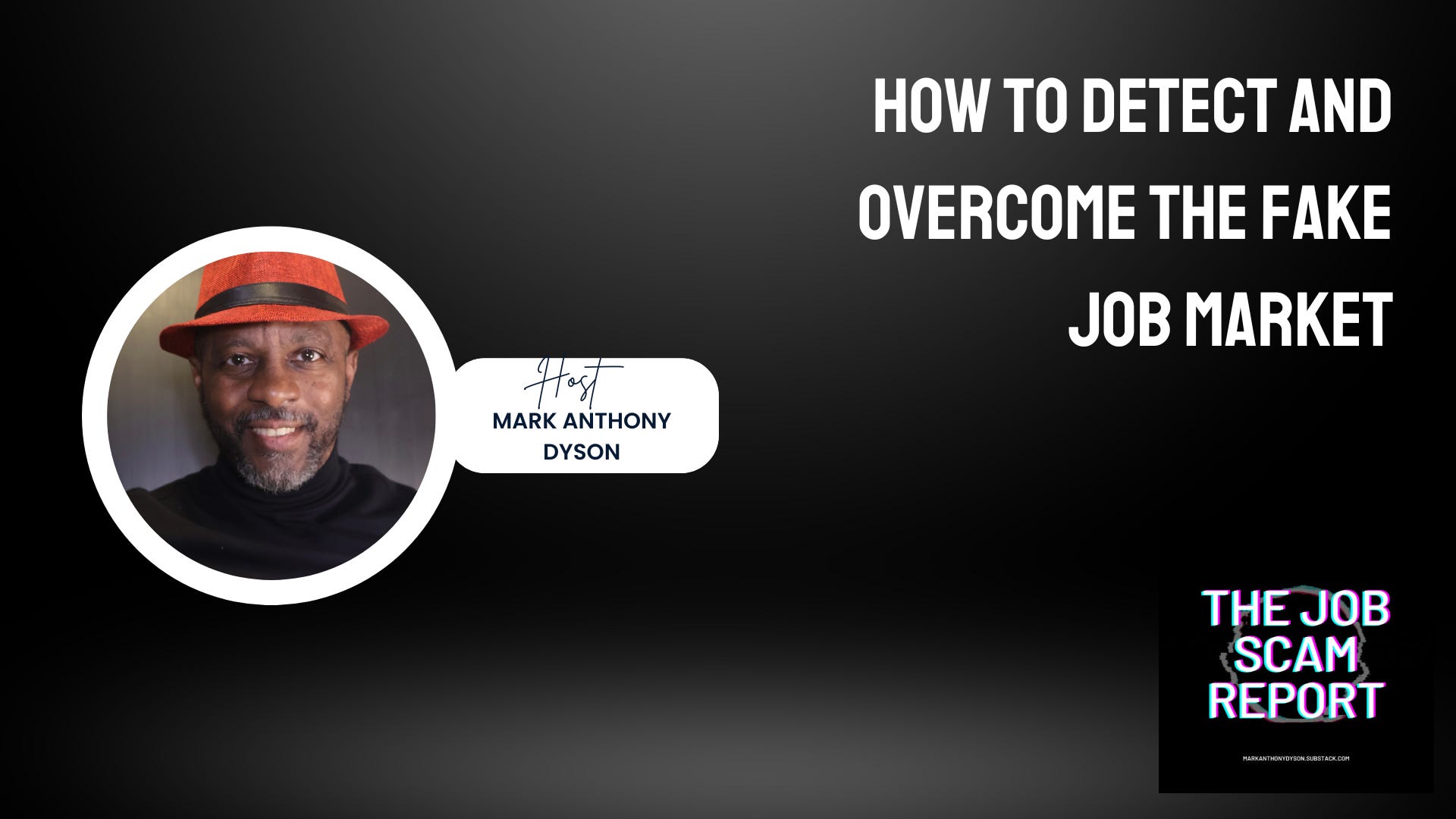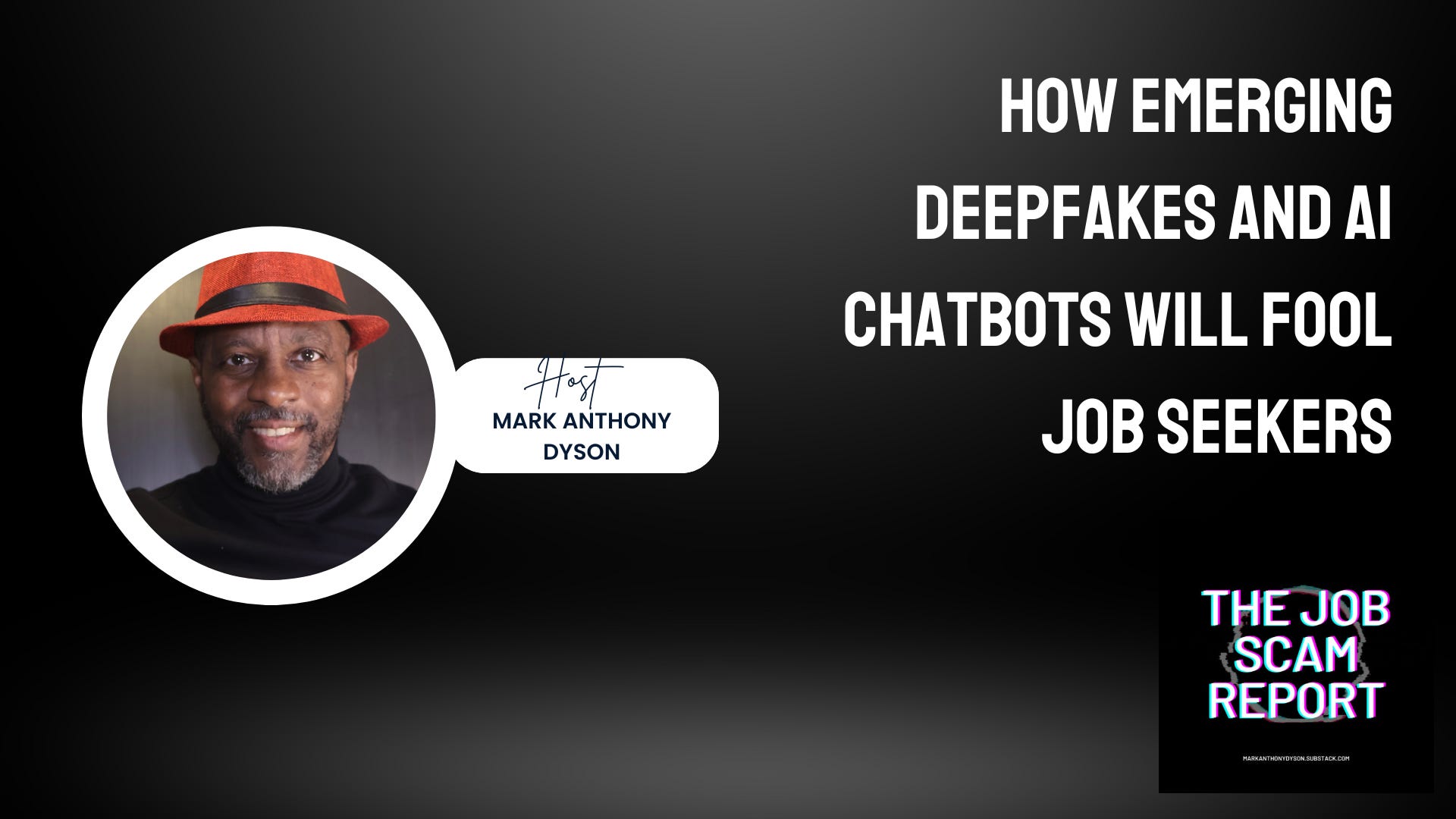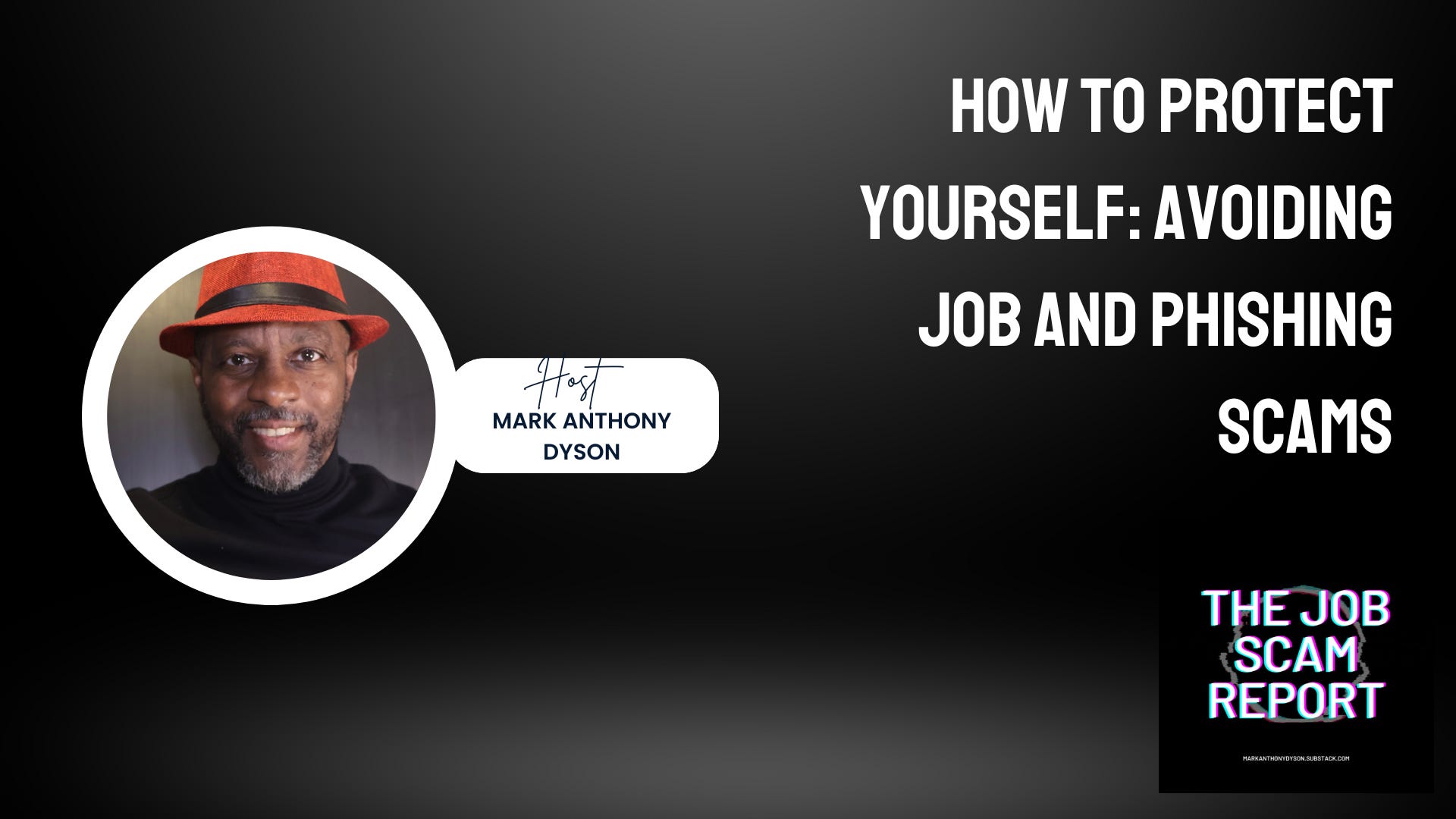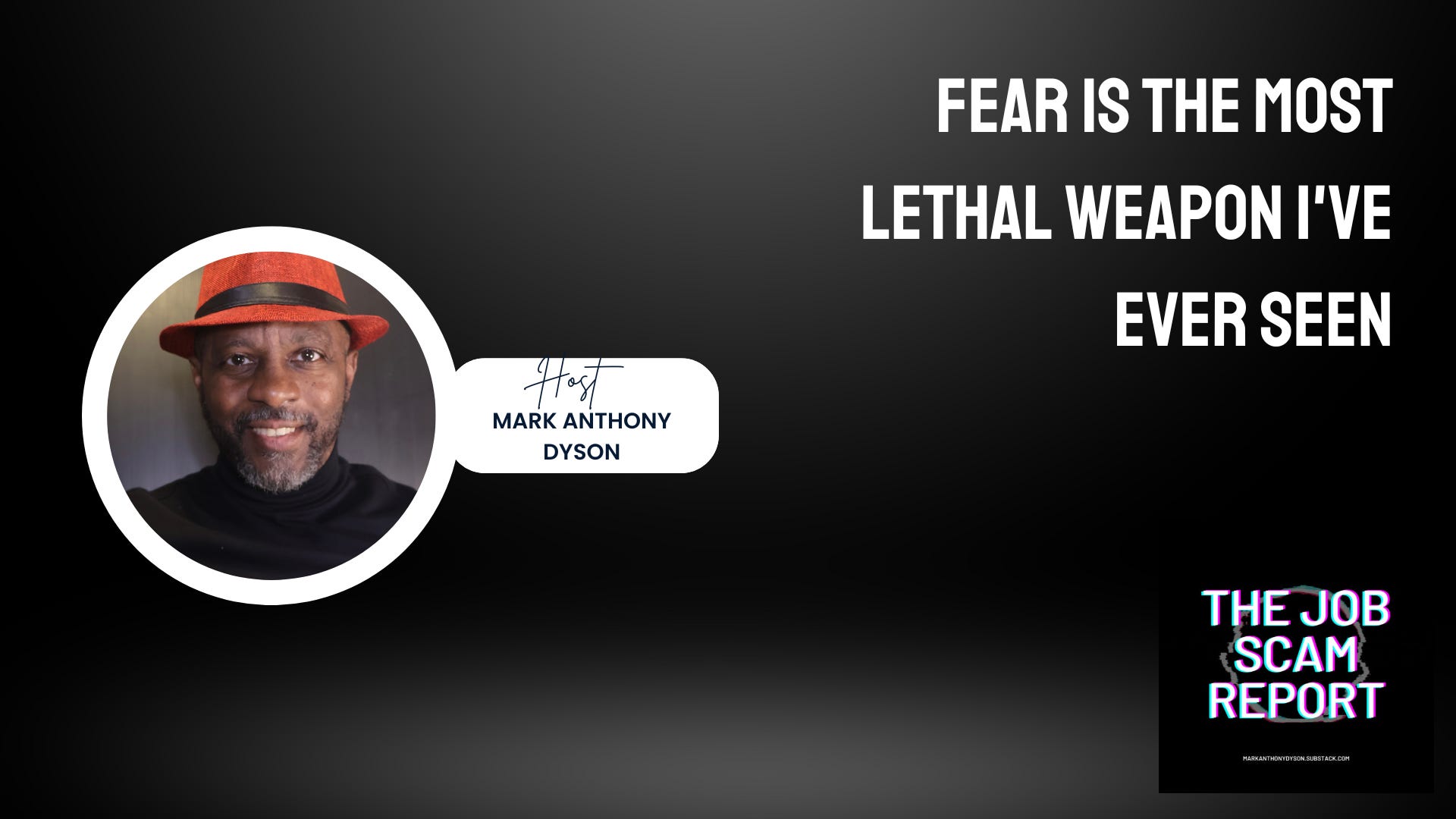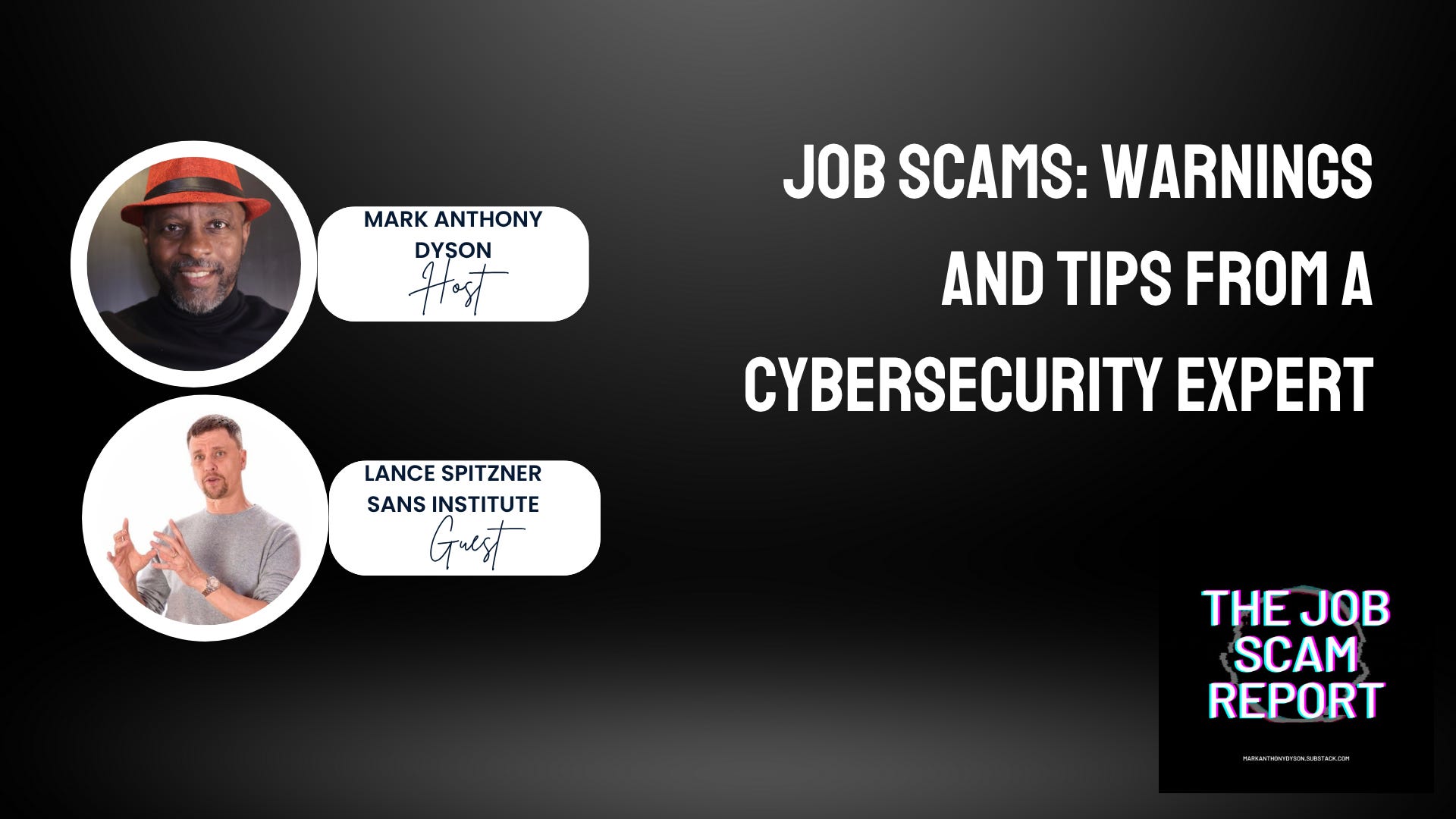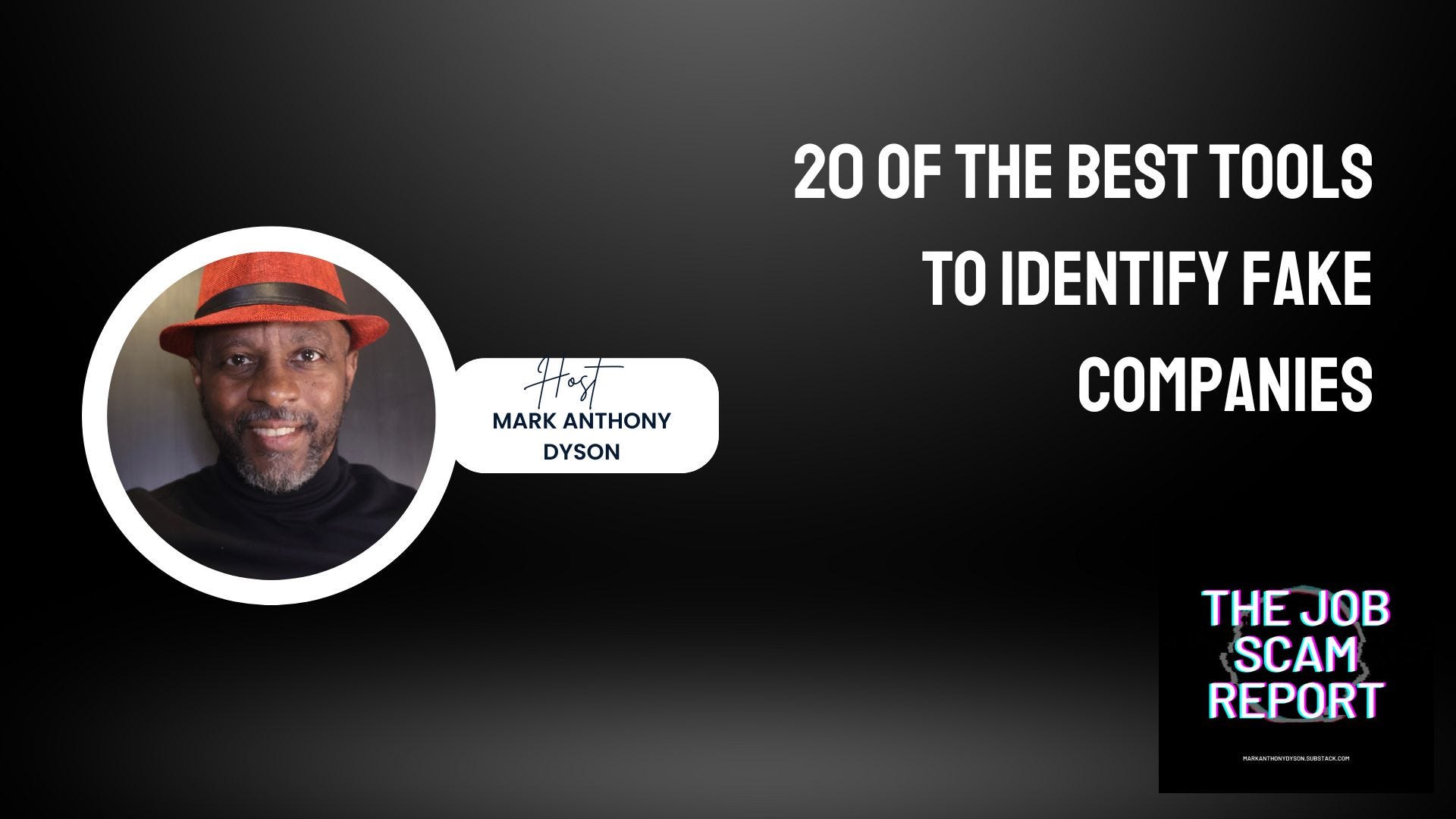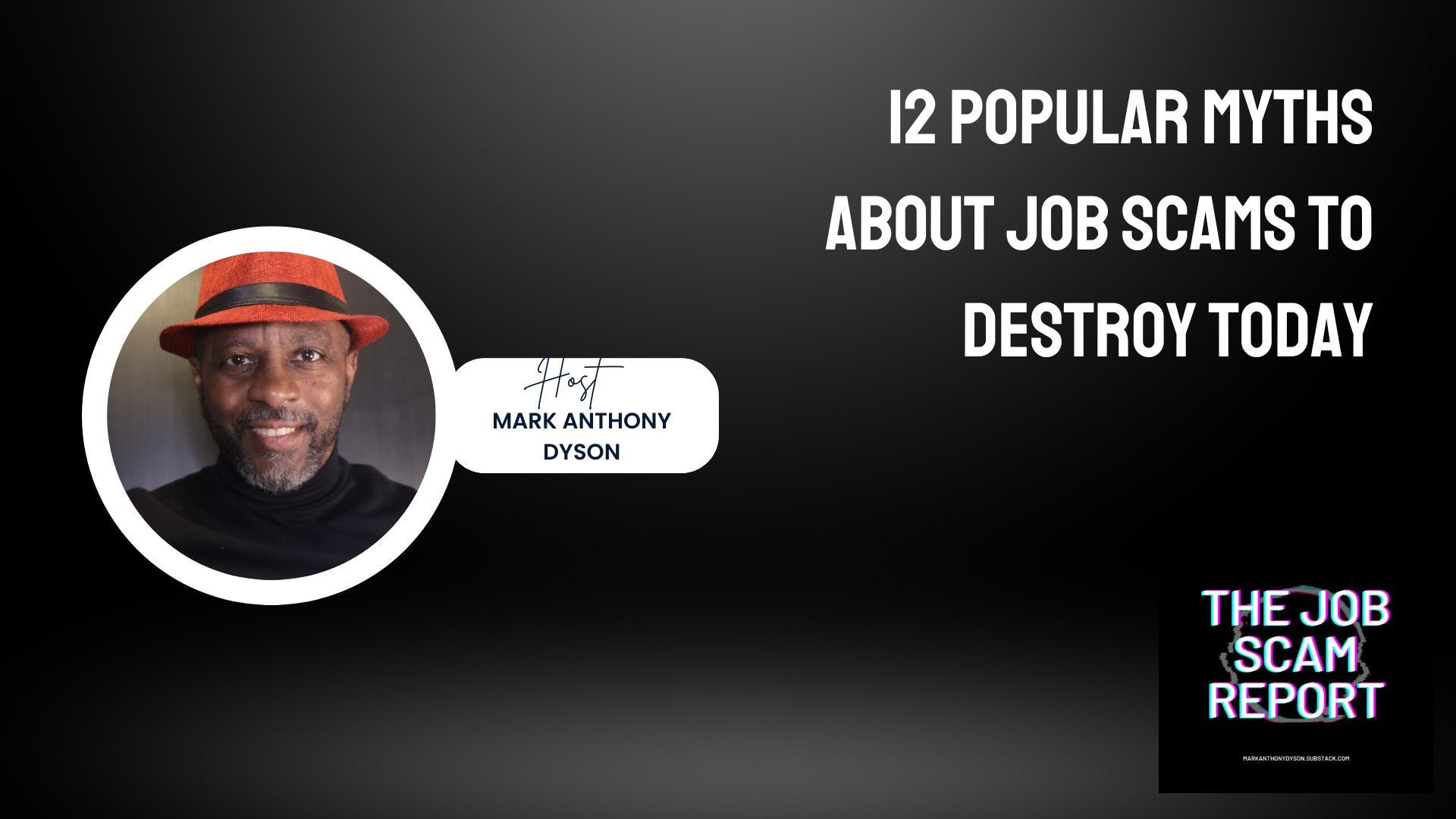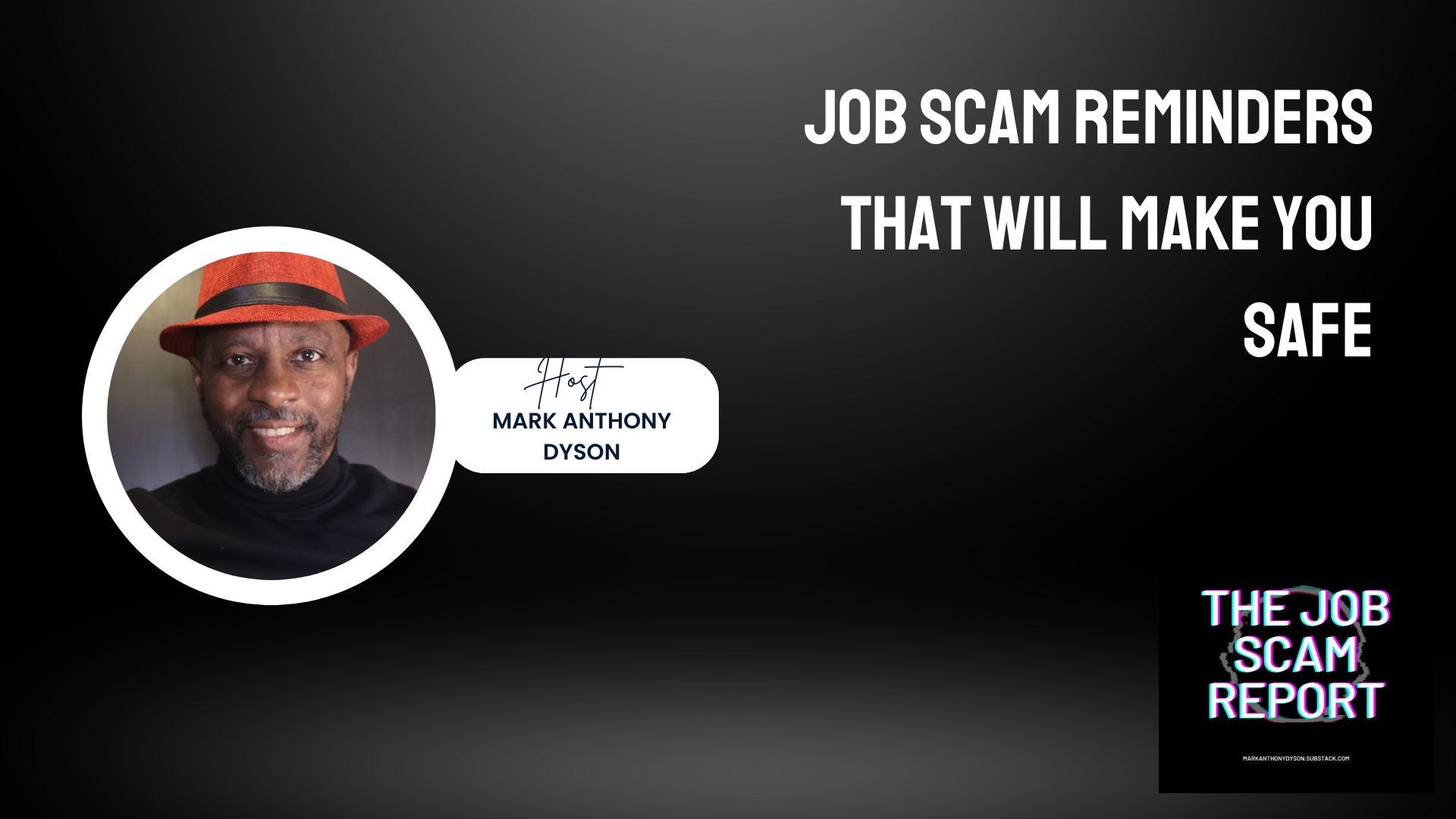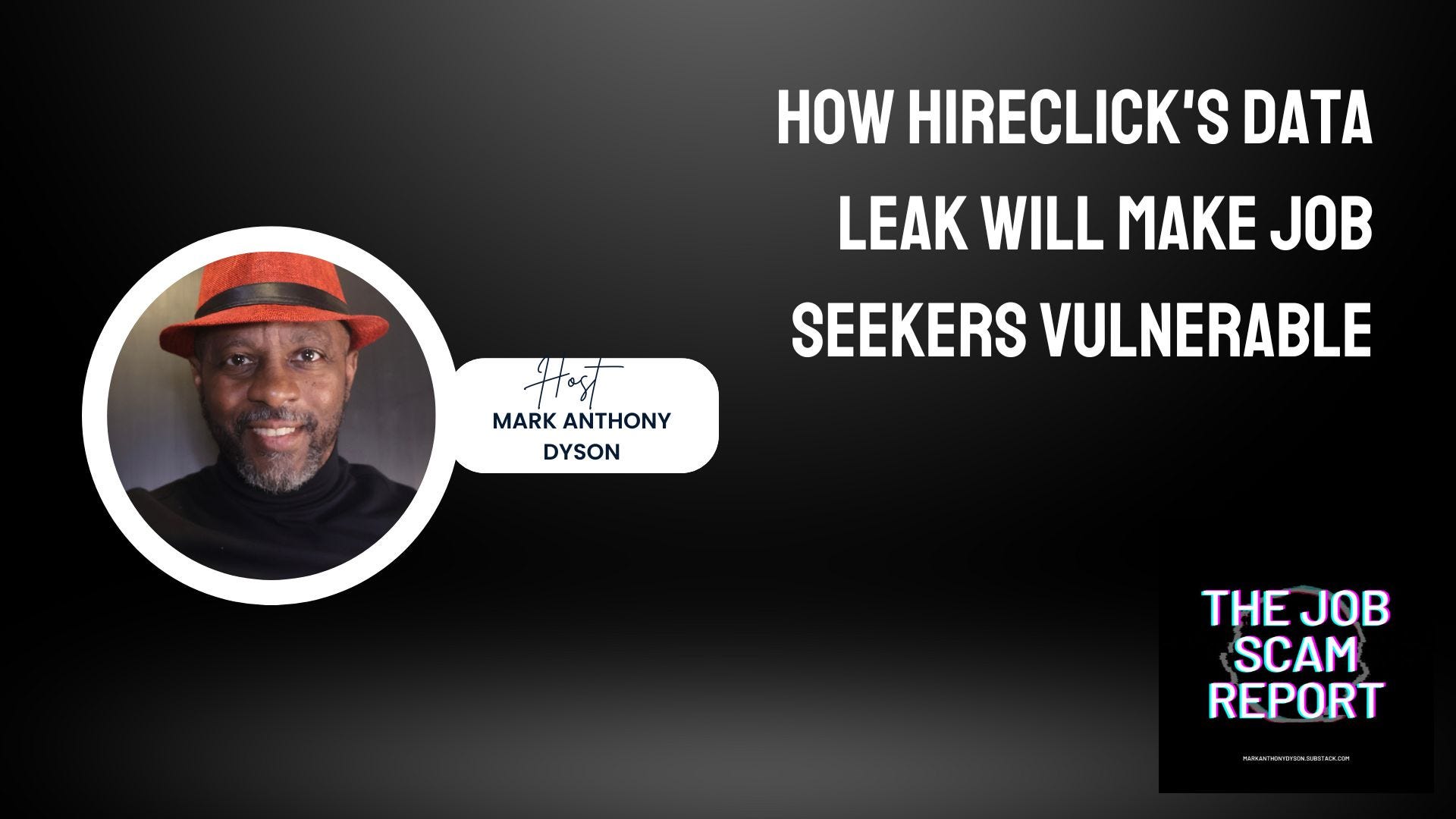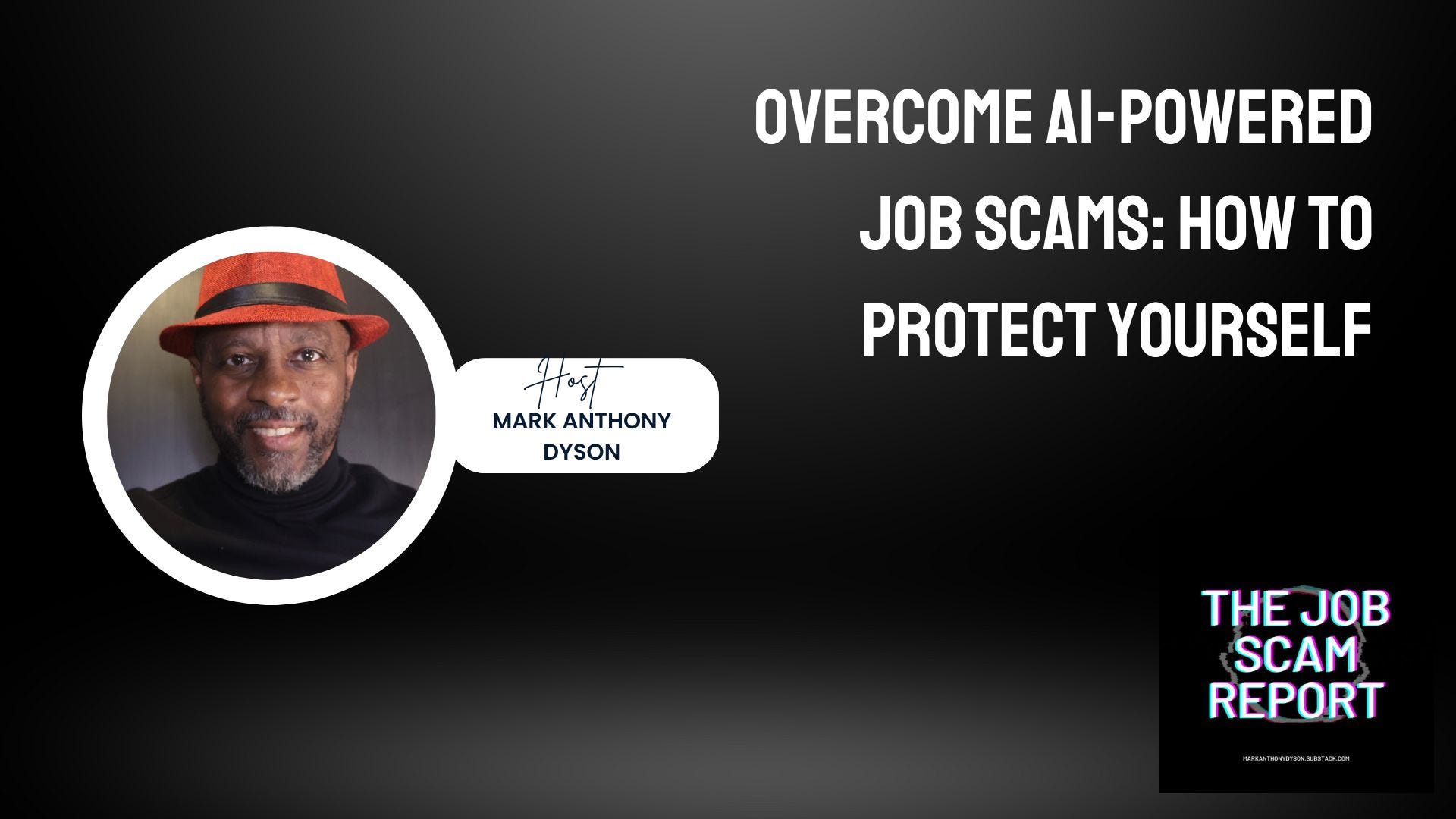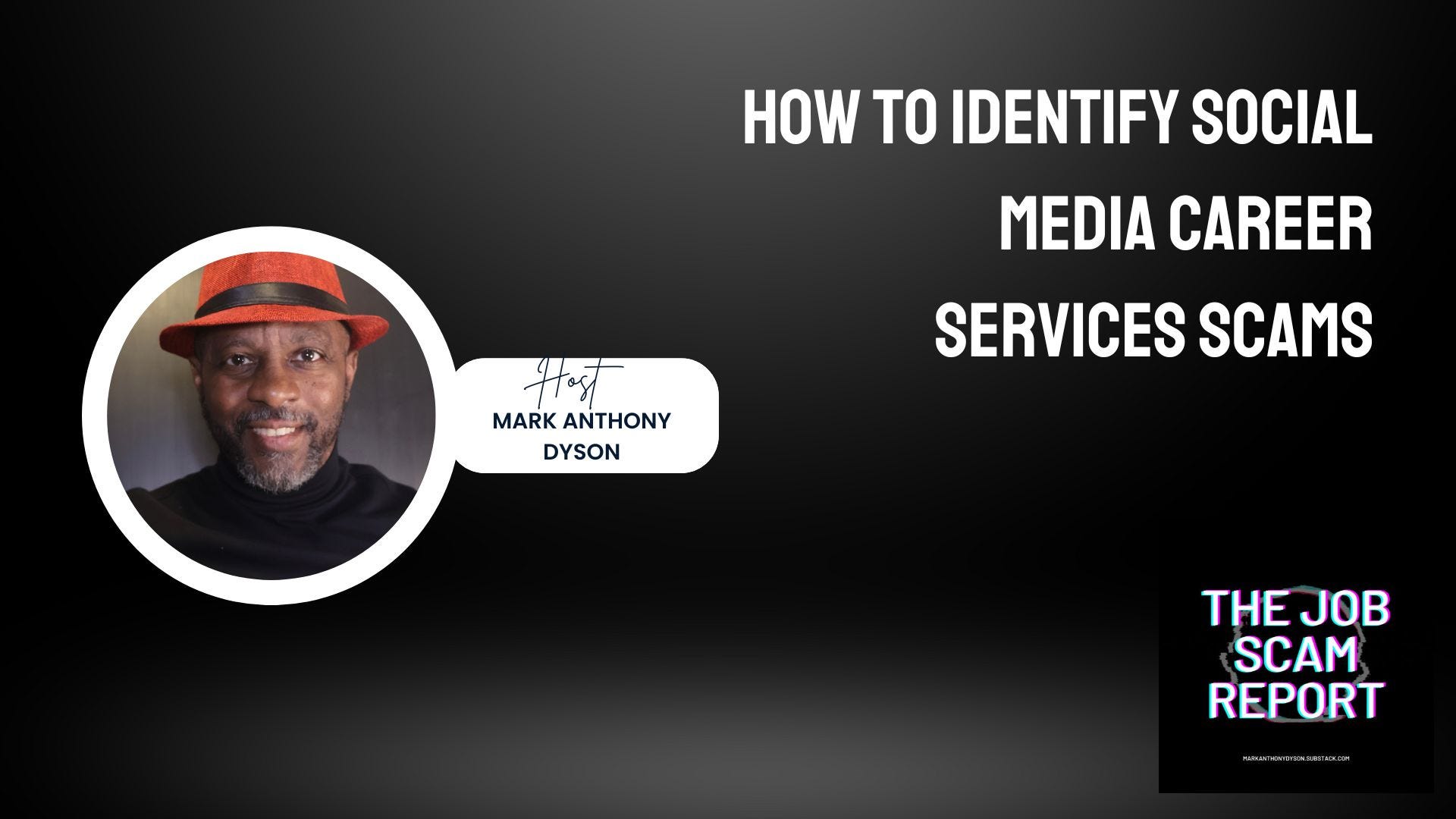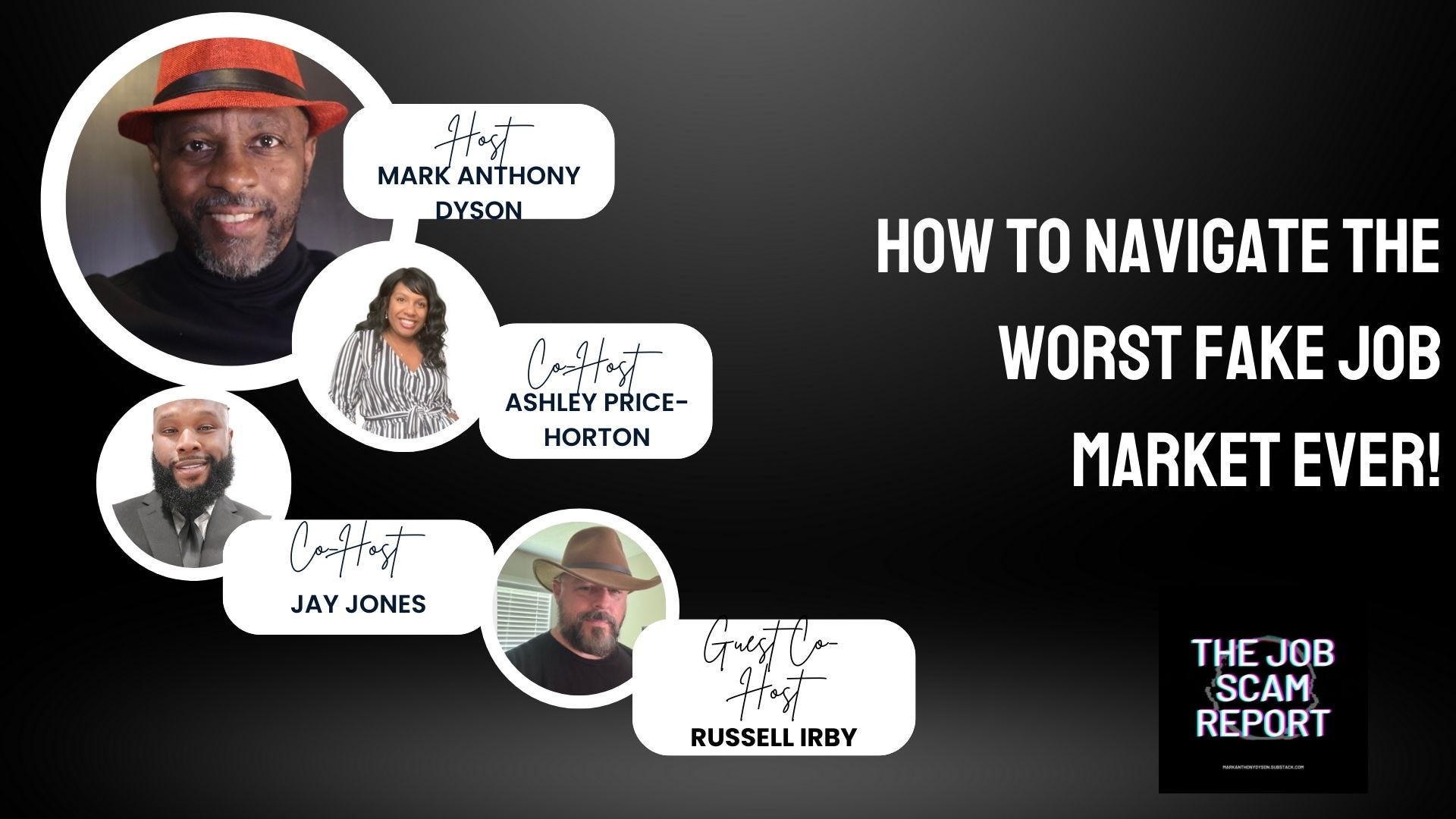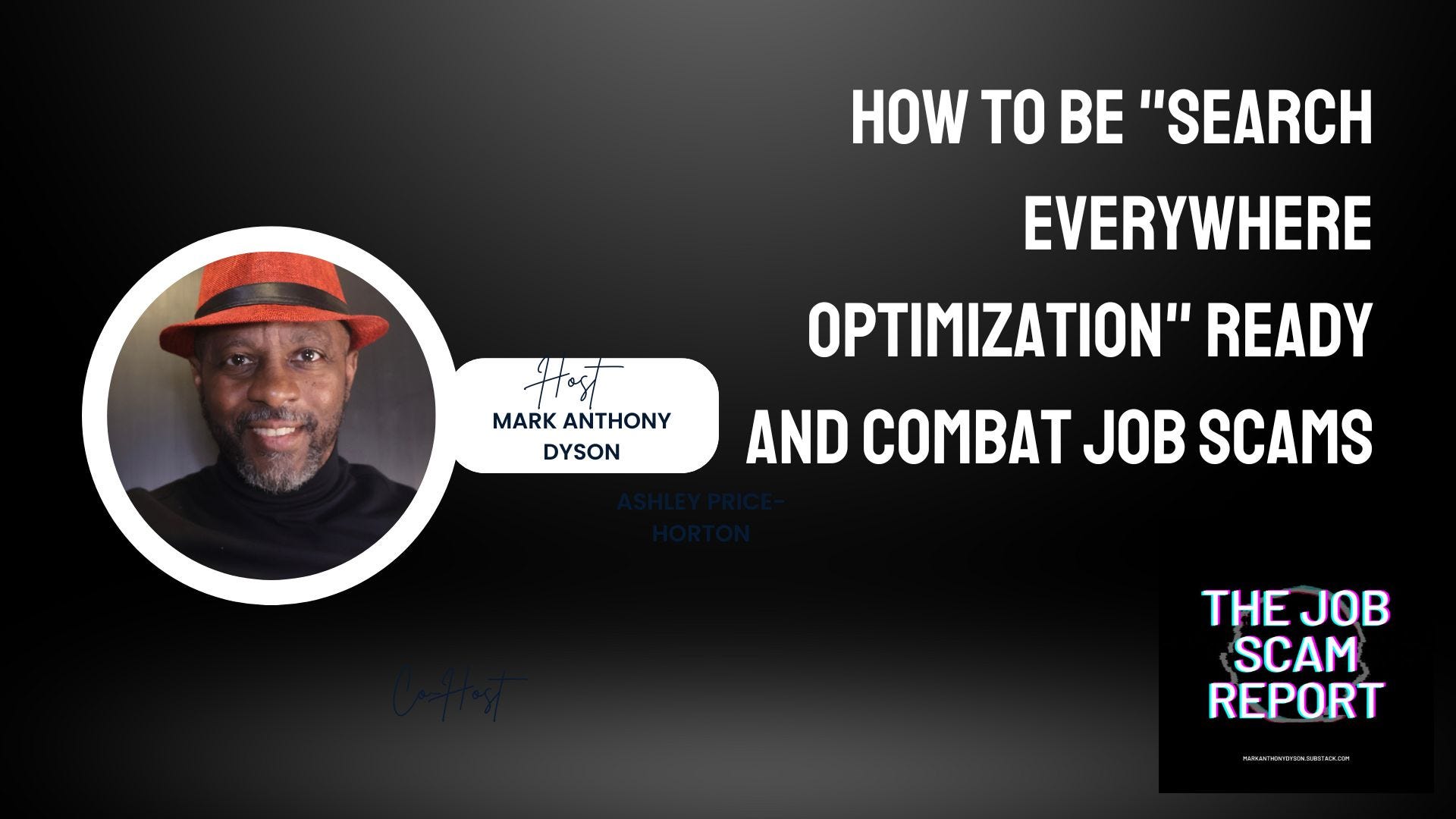Discover The Job Scam Report Podcast
The Job Scam Report Podcast

The Job Scam Report Podcast
Author: Mark Anthony Dyson
Subscribed: 0Played: 0Subscribe
Share
© Mark Anthony Dyson
Description
The podcast, “The Job Scam Report,” can only be found here on my Substack and YouTube.
I created "The Job Scam Report" on Substack in May 2024. I started the podcast shortly after realizing its potential to reach many more job seekers trying to conduct a job search without being lured by bad actors. Job scams are a pandemic in the marketplace. The sooner the signs of a scam are recognized, the quicker one must disengage from communication with them.
It should take just one sign to stop, block, and report them. Inform your network and report if you have engaged with a link, PDF, or downloaded a communication from them.
Subscribe to my Substack: markanthonydyson.substack.com.
Contact me with inquiries: markanthonydyson{at}substack{dot}com.
Along the way, I added April Price-Horton and Jay Jones as regular co-hosts. We've created memorable and informative shows that have been watched by hundreds of participants on LinkedIn Live.
Ashley Price-Horton:
YouTube: @cybercareeradvancement
LinkedIn: https://www.linkedin.com/in/apricehorton/
Jay Jones:
https://www.linkedin.com/in/jonesdoyoucopy/
We have also been featured in prominent mainstream media outlets, including Forbes, Fast Company, Yahoo Finance, MSN, The Business Journals, and others.
markanthonydyson.substack.com
I created "The Job Scam Report" on Substack in May 2024. I started the podcast shortly after realizing its potential to reach many more job seekers trying to conduct a job search without being lured by bad actors. Job scams are a pandemic in the marketplace. The sooner the signs of a scam are recognized, the quicker one must disengage from communication with them.
It should take just one sign to stop, block, and report them. Inform your network and report if you have engaged with a link, PDF, or downloaded a communication from them.
Subscribe to my Substack: markanthonydyson.substack.com.
Contact me with inquiries: markanthonydyson{at}substack{dot}com.
Along the way, I added April Price-Horton and Jay Jones as regular co-hosts. We've created memorable and informative shows that have been watched by hundreds of participants on LinkedIn Live.
Ashley Price-Horton:
YouTube: @cybercareeradvancement
LinkedIn: https://www.linkedin.com/in/apricehorton/
Jay Jones:
https://www.linkedin.com/in/jonesdoyoucopy/
We have also been featured in prominent mainstream media outlets, including Forbes, Fast Company, Yahoo Finance, MSN, The Business Journals, and others.
markanthonydyson.substack.com
33 Episodes
Reverse
I hope you enjoyed your holiday if you were off. I hope you enjoy this minisode of the podcast. Ashley, Jay, and I discuss how federal layoffs make workers vulnerable to job scams, the risks of sharing resume end dates, differences between federal and civilian resumes, and strategies for safer job searching.We are continuing to see court orders turning over mass layoff mandates, including the Supreme Court’s ruling from this past July. We can expect to see more of this this fall. Threat actors are using fake career services, such as resume writing services, to obtain personal information. Ashley explains why the end date is valuable to scammers. If you’re seeing this on Substack, you can watch the video below: This is a public episode. If you'd like to discuss this with other subscribers or get access to bonus episodes, visit markanthonydyson.substack.com/subscribe
“The Resume Is Dead” was written on the t-shirt of Vrijen Attawar, Founder and CEO of Careerspan. His company helps job seekers develop their professional story through conversational coaching and tailored resumes.Vrijen started as a career coach, and along with his co-founder of Careerspan, saw the need to address the problem of the blurred lines of fake and ghost jobs. During our conversation, one thing he made clear: the resume is a vulnerability in today’s job application process.While we don’t delve into the details, we brought into focus the prevalence of job scams, including fake jobs, ghost jobs, and the use of AI in hiring scams.Here are a few highlights from our conversation:* Careerspan helps job seekers develop their professional story through conversational coaching and tailored resumes.* Fake jobs are explicitly fraudulent, often used for data collection or to scam money from applicants.* Ghost jobs are legitimate postings by real companies with no intention to hire, often used for data collection or "cream skimming" rare candidates.* A significant percentage of HR professionals are aware of or condone posting ghost jobs for various reasons.* Job seekers are especially vulnerable to scams due to stress and desperation, which scammers exploit.* Resumes are a major vector for personal data exposure, making job seekers targets for identity theft and scams.* Companies sometimes use informal channels (like Telegram or WhatsApp) for hiring, which is a red flag for scams.* Job seekers should use traditional verification methods (Glassdoor, Better Business Bureau, LinkedIn) and be skeptical of AI tools for job validation.* Critical thinking, cross-referencing job postings, and direct communication with current or former employees are essential for avoiding scams. This is a public episode. If you'd like to discuss this with other subscribers or get access to bonus episodes, visit markanthonydyson.substack.com/subscribe
Here are some basics to apply to any and all attempts to get your financial and personal information:* Never give your passwords to anyone.* Use a password manager* Use MFA (Multi-Factor Authentication) IN all circumstances* Be a critical thinker (more in the video)1. Fake Job Application Portals* How it works: They send you a link to a professional-looking career site or “secure application form” that mimics a real company’s job portal.* Goal: You’re prompted to “log in” using an email and password — and if you reuse that password for your bank or PayPal, they’ve got a direct entry point.* Clues: URL slightly misspelled, odd subdomains (careers-companyname.xyz), or the page doesn’t exist on the company’s real site.2. Malicious Attachments* How it works: You’re sent a PDF or Word document labeled “Job Application,” “Offer Letter,” or “Job Description” containing malware.* Goal: Once opened, the malware records your keystrokes, captures passwords, or installs a remote access tool.* Clues: The file asks you to “Enable Macros” or “Allow Content,” which can execute hidden malicious code.3. Phishing Emails* How it works: A fake recruiter or HR manager needs you to “verify your account” before an interview. The link leads to a fake login page for your email, bank, or payment processor.* Goal: Steal your credentials directly.* Clues: Urgent tone (“Only filling five positions!”), generic greetings, mismatched email addresses.4. “Direct Deposit Setup” Scams* How it works: After a fake job offer, they send you forms to set up payroll and benefits. They ask for online banking credentials “to verify your account.”* Goal: Access your financial accounts under the pretense of setting up payment.* Clues: Legitimate employers never need your online banking login — only routing and account numbers for deposits.5. Fake Background Check or Credit Report Links* How it works: They claim the job requires a background check you must pay for online, using a link to a “screening partner.”* Goal: Capture your credit card logins, bank credentials, or whole SSN.* Clues: They insist you use their provided link, not a known vendor like Checkr, Sterling, or HireRight.6. “Work From Home Equipment” Purchase Requests* How it works: They promise reimbursement for buying laptops or software, but you must log into a “company payment system” to receive the funds.* Goal: Get your login credentials for PayPal, Zelle, or your bank.* Clues: Legit companies either ship equipment or use established vendors — not login-gated reimbursement portals.7. Social Media DMs With Job Offers* How it works: They message you on LinkedIn or WhatsApp about an “exclusive remote job” with high pay, then push you to complete onboarding via a suspicious website.* Goal: Trick you into creating an account with credentials you often reuse for other services.* Clues: Profile has limited work history, a recent creation date, or no mutual connections. This is a public episode. If you'd like to discuss this with other subscribers or get access to bonus episodes, visit markanthonydyson.substack.com/subscribe
I had the privilege of speaking with Michael Schuemack from IdentityIQ, a cybersecurity company monitoring scam activity. We dove deep into the surge of job scams, their tactics, and strategies job seekers can implement themselves.Michael explained that his organization can anticipate some trends, but they often confirm new scam tactics only after hearing from affected members.Social platforms like LinkedIn, Indeed, TikTok, and WhatsApp are all fertile ground for scammers, and no job board is immune. The lack of verification on these platforms allows bad actors to pose as legitimate recruiters or companies, making it even harder for job seekers to distinguish real opportunities from scams.Scammers target individuals using specific keywords, such as “open to work,” and target potential victims based on their interest in entry-level roles, remote jobs, and high-turnover fields like tech, healthcare, and virtual assistance. They prey on people’s emotions, such as stress, anxiety, and desperation.Bad actors initiate contact through messages that seem promising. Once a job seeker responds, scammers use social engineering to extract personal information or money.Michael and I agreed that blocking and reporting scammers is necessary, but it often feels like a game of whack-a-mole. The best defense is a proactive offense: research every company that contacts you, never pay for job guides or certifications as part of the application process, and be wary of job descriptions that seem too polished or generic. Trust your instincts—if something feels off, it probably is.Tools such as Grammarly and AI-detection apps can sometimes spot AI-generated or scammy content. Knowledge and awareness are the most powerful tools job seekers must embrace and practice.Highlights from our discussion:* Vet companies, recruiters, and hiring managers. Verifying and researching job postings through their official websites and job boards. Contact the company directly.* Never pay for job guides, certifications, or training as part of the application or interview process.* Be cautious of job offers that seem too good to be true, especially for remote or entry-level roles.* Watch out for job descriptions that are overly polished, generic, or lack company-specific details.* Trust your instincts. Disengage if something feels off or investigate further. One sign of a red flag is enough to block.* Don’t share personal or financial information with recruiters or companies you haven’t verified.* Use tools like Grammarly or AI-detection apps to check for AI-generated or scammy content.* Be wary of unsolicited messages, especially those that ask you to click links or provide information.* Block and report suspicious accounts, but know that scammers will keep trying—stay vigilant.* Educate yourself about the latest scam tactics and share what you learn with others.These are two subscriber-only pieces of content I’ve recently published. These should be very helpful to combat job scams. If you’re a free subscriber, and would like to get the additional member content available, and to come, upgrade your subscription below: This is a public episode. If you'd like to discuss this with other subscribers or get access to bonus episodes, visit markanthonydyson.substack.com/subscribe
Just like a landmine of explosives covered by dirt, in plain sight, the fake job market exists. Job seekers are fatigued by the numerous dead-end applications they’re filling out. Fake jobs from phony companies are listed on the same page as ghost jobs from legitimate companies, and the average job seeker now has to conduct due diligence before applying.Right now, consider its present state the norm, with any change out of the question. I wish there were a fake job board. But, how would it be different than the ones now? A Greenhouse survey from last winter revealed 18%-22% of job boards list ghost jobs.Fake jobs vs. ghost jobsLet’s say it’s the job seeker’s fault they’re not researching companies before applying. Are they likely spending 20% or more of their time chasing the wind?Blurred lines exist at first glance. Let’s define them:Ghost jobsCompanies will post a job to fill their talent pool pipeline. They want options and want to fill their database. The company intends to use a data storage company to store resume information. Companies are also competing for talent, and more data offers a perception of being bigger than they are.Fake jobsIt’s not a job at all, and the company is fake. The saying is true—a bad tree doesn’t bear good fruit. Many fake companies will copy a real company’s website and alter their site’s spelling slightly enough to mislead potential candidates.Three of the most common red flagsSocial Engineering is the driver of success for the parasites listing the fake jobs you see. The illusion begins with their understanding of what stressed, anxious, and desperate job seekers will do: they’ll do anything to make a living.I list three common red flags here, but you’ll need the subscription to see the entire list:Unrealistic Compensation: Be skeptical of jobs offering exceptionally high pay for minimal work or salaries disproportionate to the role or your experience level. Always ask questions about why a salary is unusually generous for posted positions.Easy Apply” with High Pay: This combination is a classic scam indicator designed to attract many applicants quickly. It’s best to research the average salary before launching a job search to know the average for the state, region, and nation.Vague or Poorly Written Job Descriptions: Job ads lacking specific details, grammatical errors, or using generic, jumbled, or robotic language.Overcoming the fake job marketMany are telling you, “Don’t cry over what you can’t control.” While it hurts to hear what seems to be a lack of empathy, it’s true. We know good candidates are being overlooked. It’s unfortunate fake and ghost jobs are often confused with real opportunities.The modern job search has changed to where the work to separate the chaff from the weeds must come first:* You must own your results with clarity, endurance, and discernment in equal portions. The more specific you narrow your search, the more willing you are to research to ensure your value matches the employer’s need, and the opportunity is truly something they’re looking for.* You must approach each company with a clear understanding of how to meet their specific needs. I’m not talking about fixing your resume and LinkedIn profile here. You’re essentially the prescription to their job description.* While I don’t buy the whole “hires are 80% from referrals” narrative, I do believe connecting to employees of your ideal company who can provide insider information about a company (who can also confirm they’re hiring) is a powerful tool. You can increase your chances if the person has worked with you previously and can speak to your abilities.* Prepare for interviews diligently. This step can also help you avoid scam interviews. If the interviewer is not forthright in confirming people you’ll meet with, then RUN! Confirm what type of interview you’ll participate in, whether it’s with one interviewer or a panel, or if it’s a virtual interview. Determine if a recruiter is calling for a phone screen or an actual interview (note that phone screens are not considered interviews).No matter what phase it is, please don’t give your personal information until it feels right, you’ve done the research, and have no doubts the opportunity is legitimate. There are in-person job scams, too. The cautiousness is for your protection and well-being.Don’t forget about these resources…The following guides are now available to paid subscribers. To access all the platform’s content, consider getting a paid subscription. You can upgrade below:Finally…My friend Jon Shields runs the job board, Jobsearchdb. When you're looking for a job in a specific industry or career field, using job sites that focus on the types of jobs you're interested in can be a time-saver. The Job Search Database includes links to 1,000+ niche career sites, organized by category. Jobsearchdb is free. This is a public episode. If you'd like to discuss this with other subscribers or get access to bonus episodes, visit markanthonydyson.substack.com/subscribe
There will be victims of deepfake job interviews. Most job seekers don't prepare adequately for job interviews, and even worse, they often don't know what to expect. The lines are less blurred between the deepfake videos of last and the ones where technology enables anyone to create videos of seemingly real conversations between two people. The mouths and actions are entirely in sync.Similarly, AI chatbots can hold conversations to a certain extent, but when paired with deepfake video and AI voice technology, communication becomes even more seamless in delivery.Let's discuss how to spot them in real-time, and I'll offer some safety measures.1. AI-generated looks so realI bet you haven't seen Google's VEO 3. I provide an example to demonstrate how the AI-generated characters' lip movements perfectly synced with their facial expressions and voice inflections. Open-source deepfake videos are available to the public, allowing users to create fictional characters and scenarios similar to those found in movies.Have you visited your credit card company and used their AI-powered chatbot yet? They can respond to inquiries, answer questions, and provide follow-up information as needed. These are available to anyone.These open-source tool designs are simplified, allowing anyone without technical experience to create content, products, and services to enhance their quality of life, holistic learning and development, or personal purposes. All of them can run on your laptop or mobile phone.Anatomy of a Deepfake Interview ScamBad actors desire to move quickly to get your personal information. Unfortunately, trusting victims don't see anything wrong until it's too late. Here’s an important reminder of how thorough you should be: Get clear on what kind of interview you should expect. Will you be on Zoom or another platform? Is it a panel interview or with one person? Is that person the hiring manager or an HR professional? What is the name of the person? You have a right to be suspicious of Fake profileBad actors take an aggressive approach using a hijacked or duplicated LinkedIn profile. Hacked long-term unused but real profiles to imitate a recruiter or hiring manager. They bank on you not contacting the company directly or researching the role.Bad linkThe fake hiring manager sends a link to transact outside the platform, to a custom video-interview platform. In some scams, this hiring manager has gotten your personal information. In other cases, they are collecting information and won't ask real job interview questions to identify if you're the right candidate. The link sent was a phishing link. It accesses your computer, whether it's a mobile device or a laptop, and steals personal and financial information. Their links could also install spyware and malware on your device to track your web activity and login.Live session with a deepfake avatarThere are several layers to this "job interview." First, you receive a link to a bogus Zoom room or Microsoft Teams link. A slightly misspelled URL creates the illusion of being a company-proprietary site. You'll likely face an avatar with an AI-tuned voice with a response that's not human.They can respond to questions and even know and use your name. Most people sense something is "a little off" after their "interview." There is a script, so if you ask an unusual question, it will throw them off (similar to the AI chatbot).Stealing your dataThe meeting will result in them giving you a "job," but not without an attempt to get your personal and financial information. If you visit one of their suggested sites, you'll need to perform a scan to detect any malware or spyware may be loaded on your device. Any previously recorded audio can be used as a template to train AI models on your voice, which scammers can then use.How to detect a deepfakeKerry Tomlinson of Ampex News collects deepfake samples. In this short, she tells me a big part of the psychology of deepfakes is people want to believe they’re real:Here are some ways to detect and ways they can psych out victims:* A stolen picture is used as an avatar, only to animate its mouth with audio (likely stolen). It appears to be a still picture with a moving mouth.* People want to believe the opportunity is real because of anxiety, stress, or depression.* They cannot perform spontaneous requests, such as hand-to-face movements or a hand wave.* Lack of facial expressions and voice inflections. The voice sounds like a robot or a machine.4. Verify the interviewer, the company, and the employees using LinkedIn.This part can be tricky because fake hiring managers and recruiters will use real profiles to add to the illusion of legitimacy. Most of the time, bad actors use AI-generated bots at scale. They disappear and then reappear as another profile.Here are several quick checkpoints to verify the information someone gives you:* Fake email address by using a Gmail, Yahoo, or other vanity email address. The email domain may be a subtly misspelled word.* Use Google's reverse image search tool to determine if the profile belongs to the owner.* Check the profile owner's comments to find constantly repeated comments and posts.* See if they refer people to fake email addresses.* The fake profile often inflates their follower counts, claiming to have hundreds or thousands of followers, or it may have only one or two followers.* The profile owner's location is in an unheard-of country.You can check the company by using whois.com to see the site owner and the launch date. Use this resource to verify the validity of other site checkers.5. Your quick checklistResearch first* Google the recruiter’s name + “site:linkedin.com”* Search the company's careers page for your role* Check AI LLMs (ChatGPT, Perplexity)Inspect every link* Hover over the link* To reveal the actual URL to look for typos/quasi‑domains* Check to see if a less familiar company is a business entity* Do go to the mispelled link. Google link to see if it's flagged.Confirm via official channels* Email or call the company's HR address on their website: "Hi, I received an invite from XXX. Is this valid?"* Go to the company's website directory or Masthead* Find the company's recruiter to verify the listing* Check your network for people who work at the company (or find their 2nd connections or ties to ask)Multi‑factor proof* Ask for both a calendar invite and a call link through their ATS (Greenhouse, Workday, Lever)* Ask them to send you a LinkedIn invite* Be suspicious of scarcely filled-out LinkedIn profiles* Request additional proof (actual recruiters will go the extra mile to verify their authenticity and credentials).Limit what you share* Never submit sensitive documents (SSN, bank info) before an offer letter* Former federal workers should never share their long-form resume with civilians.We must train our defenses to verify everyone and everything before responding to a job description or offer. One of the most effective defenses is the ability to apply critical thinking skills throughout the process. Do the research, verify each resource, clarify each obscure point, vet all answers, and provide direct answers to the questions you ask.New paid subscriber content.This is the first of a string of paid subscriber content for this summer. I created a simple toolkit to help you identify warning signs of a job scam. You can defend against any scam and avoid them in the future. You know, I’ve said before, all you need is one sign to RUN AND REPORT.Paid subscribers can access all content. If you want the list, consider purchasing one of our subscriptions. You can view all of the choices below: This is a public episode. If you'd like to discuss this with other subscribers or get access to bonus episodes, visit markanthonydyson.substack.com/subscribe
"Have you ever felt a rush of excitement upon receiving a job offer that seemed too good to be true?” Many college students will face this dilemma, especially new grads. I participated in a panel a year ago at St. Xavier’s University in Chicago. I was joined by several other panelists: Lauren Milligan, Dr. Vincent Alexander Davis, and moderator James Miller. The featured clip on this week’s episode focuses on job scams and how students must navigate them. On this panel, I recount how job scams have evolved from targeting older individuals with simple, email-based scams to more sophisticated methods that exploit technological advancements. Scammers now seek not just money but also valuable personal data, employing tactics such as creating fake websites and sending convincing emails that appear legitimate. I highlight cases like the security breach at Purdue University and the $ 25 million stolen from a company via deepfake video calls, demonstrating that scams can deceive even tech-savvy individuals. He advises vigilance, emphasizing that anyone, regardless of their technical knowledge, can fall victim to these scams. James and Lauren describe common scam tactics, such as demanding application fees or asking for equipment purchases from third parties, which legitimate companies never do. Lauren and I emphasize the importance of additional verification steps, such as reverse-searching recruiters’ profile pictures and verifying LinkedIn profiles for authenticity. Lauren underscores that legitimate job offers can come through LinkedIn or Indeed, but skepticism is necessary. I point out scammers are expert marketers, preying on job seekers’ desperation with attractive but fake offers. Vince reminisces about past scams done via newspaper ads, noting how modern scams are more complex to detect. He adopts a cautious approach of deleting and blocking suspicious communications, but acknowledges the importance of reporting these incidents.The discussion encourages leveraging personal networks as a safety mechanism, but advises remembering that even friends or family might fall for scams. Lauren and I recommend increasing awareness and asking many questions when something seems too good to be true, emphasizing the need for critical thinking and vigilance. Lauren concludes by quoting a Washington Post article, stressing that no one is too smart to get scammed, illustrating the relentless and evolving efforts scammers put into deceiving even the most careful individuals.FINALLY…I just published a new toolkit, “The Anti-Job Scam Toolkit: Know & Avoid These Risky Red Flags.” For those with paid subscription access, it’s free of charge. This toolkit includes a checklist of red flags that you can quickly review to help you identify potential issues in text, email, or LinkedIn posts. It’s one of many guides and tools to come to our community to help you grow your awareness and knowledge of job scams. To access these special offers, you’ll need to purchase a monthly subscription at a minimum. This helps me to continue working here on Substack. These resources will be updated, while others will be newly added. The Job Scam Report is a reader-supported publication. Please support my work, and consider becoming a paid subscriber. This is a public episode. If you'd like to discuss this with other subscribers or get access to bonus episodes, visit markanthonydyson.substack.com/subscribe
Thanks for joining me on The Job Scam Report. Today, I opened up about a topic often left unspoken in the job search—fear—and how it quietly plays a role before someone even falls for a scam. Fear doesn’t just show up after the damage is done. It starts when someone’s been laid off a few times, faced long-term unemployment, or is struggling to pay bills. Fear leads to desperation, and desperation clouds judgment.Fear is the sword of our actions. We’re in a time where scammers prey on fear. They know people are anxious, exhausted, and trying to make ends meet. That’s why fake jobs with big salaries, unlimited PTO, and flexible schedules sound so tempting. It’s not just about greed—it’s about hope, survival, and fatigue.I’ve seen it over and over: job seekers apply to hundreds of listings, not realizing they’re giving personal data to people who want to exploit them. Scammers don’t just want a few hundred bucks—they want your identity, banking info, and data. That’s the real currency.Clarity can conquer fear and uncertainty.But here’s the good news—we can manage fear before it controls us. If we shift our mindset early, we reduce our vulnerability. We must research companies, understand how real recruiters operate, and build a solid network to help us spot red flags before they become regrets. Preparation is your best defense. You don’t need to chase every opportunity, especially if it sounds too good to be true.Conquering fear before the job search begins gives us clarity, discernment, and power. It helps us avoid mistakes costing more than money. This isn’t just about job scams—it’s about protecting your future. So let’s start with mindset and end with strategy.Three points to highlight:Fear starts before the scam – Layoff PTSD, unemployment fatigue, and financial pressure make job seekers vulnerable.Scammers want your data, not just your money. Identity theft is more profitable than a one-time theft.Preparation is the best defense – Research, realistic expectations, and a strong network are key to scam-proofing your job search.In another segment, my friend, Jack Kelly, Founder and CEO of The Compliance Search Group and Wecruitr.com, and Senior Forbes Career Contributor, and I discuss job scams. This is a public episode. If you'd like to discuss this with other subscribers or get access to bonus episodes, visit markanthonydyson.substack.com/subscribe
SummaryIn the episode of “The Jobs Scam Report” podcast, we discussed recent layoff trends, the associated rise in job scams, and strategies to avoid them. Jay Jones and Ashley Price Horton joined me to share insights on red flags, evolving scammer tactics, including deepfakes and AI-generated content, as well as best practices for job seekers, with an emphasis on cybersecurity.We also tried to highlight new security threats, the importance of effective password management, and the risks associated with sharing personal information.We also miss Russell Irby, who consistently shares his job scam findings and valuable HR perspectives as an HR leader. Show highlightsLayoffs, Scams & Job Market Trends* Major recent layoffs have been reported at Intel, Microsoft, and Lululemon; these layoffs create new opportunities for scammers to target job seekers.* Public sites, such as the WARN Act, layoff.com, and Reddit, are valuable resources for identifying upcoming layoffs and related scam activity.* Alumni groups of affected companies (e.g., Microsoft) have become essential channels for sharing insider information and avoiding scams.* Job seekers are advised to research thoroughly before applying, using forums such as Glassdoor and Reddit, and to be wary when accepting offers from recently downsized firms. * TheLayoff.com is a good resource for pre-layoff chatter and rumors. Red Flags & Evolving Scam Tactics* Classic scams are resurfacing, including fake recruiter messages and right-to-represent (RTR) email scams.* RTR is an opt-in process that allows a potential candidate to authorize a recruitment agency to represent them for a specific opportunity. * Empathy-based messaging is on the rise, with scammers leveraging current events (e.g., layoffs) to appear more credible.* Scammers are recycling old techniques, including using stolen images, fake websites, and exploiting the victim’s short-term memory.* Rise of “donation saboteurs” exploiting GoFundMe and similar platforms for scams.* Advice: Ignore, block, or delete suspicious contacts, and also publicly report and comment to warn others, thereby enhancing collective protection. Often, it’s best to ignore. Cybersecurity Best Practices for Job Seekers* Never reuse passwords; use unique, strong passwords for each account and change them every six months.* Use reputable password managers (e.g., Bitwarden), enable multi-factor authentication, and secure primary email with a unique password.* Avoid including sensitive information (e.g., home address) on your resume unless it is essential. Government job applications are exceptions and require accuracy.* When companies require an address in an online form, consider using a P.O. Box or a local address, unless you are applying for a federal role.* Be aware of the dangers from fake federal resume writers, who may solicit sensitive personal information under false pretenses. While traditional resumes contain a vast history, new federal resumes now average two pages. Don’t send anyone your traditional resume. * Use a VOIP number for job search applications and avoid unnecessary disclosure of personal data. Stop including your physical address and use a dedicated Gmail account for job search-related communications. Deepfakes, AI, and Advanced Scam Technology* Deepfake technology is rapidly advancing and being exploited by scammers to create compelling fake interviews, videos, and social media content.* Recent examples include AI-generated interviewees and altered images evade reverse image searches.* Job seekers and professionals are advised to verify the authenticity of digital communications and videos, as scams are expected to become increasingly sophisticated.Community & Platform-Specific Threats* LinkedIn and other social networks are inundated with fake profiles, many of them premium and aged, making detection and removal difficult.* LinkedIn is likely struggling to keep up with removing accounts from bad actors who are creating AI-generated fake profiles at an alarming rate. * Even verified and established accounts can be hacked or mimicked to perpetrate scams.* Companies and recruiters are encouraged to bring more attention to this issue, as fake recruiting affects both candidates and corporate reputations. We do see some recruiters making the effort to warn LinkedIn users when they find accounts imitating themselves or their company.* Panelists urge continuous vigilance and reporting to both platforms and broader networks. Word-of-mouth to the public appears to be the fastest method for warning the LinkedIn community about fake accounts. Announcements & Upcoming Events* Ashley is working towards securing $3 million in job offers for her clients by the end of July, sharing opportunities and success stories on LinkedIn.* Jay, who is presenting scam avoidance strategies in a July talk with B Wise, has launched a new podcast and newsletter with over 2,000 subscribers.* Mark to release new content on scam avoidance and announce future projects as details become public.Decisions* Emphasis on Public Reporting and Education — Panelists agree that actively reporting and publicizing scams is more effective than simply blocking them, as it collectively improves awareness and prevention.Open Questions / Follow-Ups* How universally will the federal two-page resume rule be applied across agencies, and what is the official implementation timeline?* Continue monitoring the effectiveness of Google’s and other image and search tools for detecting altered scammer images.* Await further details and public announcements about Mark’s confidential projects.Watch the replay:The Job Scam Report is a reader-supported publication. To receive new posts and support my work, consider becoming a free or paid subscriber. You can also donate any amount as a way to support this work if the value has been beneficial to you. This is a public episode. If you'd like to discuss this with other subscribers or get access to bonus episodes, visit markanthonydyson.substack.com/subscribe
In today’s episode, I am featuring Lance Spitzner, Workforce of Cybersecurity at SANS Institute and a board member of the National Cybersecurity Alliance. Highlights of our discussion:* Key points include the importance of vigilance, verifying information, and recognizing red flags such as unsolicited offers and requests for personal info or payments. * Scammers may aim to steal money or personal data, often using emotion-based tactics to target desperate job seekers. * Organized crime groups and state-sponsored actors have increased the sophistication of scams. * Technological advances, including artificial intelligence (AI), enable scammers to operate on a larger scale; * The fundamental red flags and indicators of scams remain consistent.Careers that will stand the test of timeThis chart is from a Hostinger chart, which I thought was interesting. These are careers likely to withstand the onslaught of Artificial Intelligence. This does not mean it won’t use it. On the contrary, AI will enable them to scale their work products. Nothing to glean other than you being informed about a potential pivot, or a way to add value to those professions. See the complete study. It’s a Google Doc, and it’s organized into four categories. Finally…Catch the replay of yesterday’s LinkedIn Live below. Next week, I'll publish the show for podcast listeners and show notes. This is a public episode. If you'd like to discuss this with other subscribers or get access to bonus episodes, visit markanthonydyson.substack.com/subscribe
We’re in a job market where fake and real jobs are listed on the same job boards, with few differences in the job descriptions. Job seekers don’t have to go to a job site to land fake jobs. Unsuspecting job seekers have gone to fake job sites and not applied. They are still targeted because fake sites will install malware and spyware. In this episode, I discuss several tools job seekers can use to check any website to see if it’s legitimate. You’ll be ready to check any website provided to you via text message, email, or referral. By the way, check the site to see if someone you know referred you (they might pass it on because someone recommended it to them). How do fake sites deceive you?Fake job sites scrape information from real ones to fool visitors into thinking they should apply there. The illusion of authenticity lures victims into forking out and even investing upfront to acquire equipment for a seemingly well-paying job. If the visitor doesn’t click on the attachment (which may also contain spyware or malware) and instead visits the site, they will be asked to fill out a fake application, providing the fake company with their personal information. As I always say, scammers “get you before they got you.” How to use domain verification site tools. The fake recruiter who approaches you in any communication will expect you to check them out, so you would think. But, many are looking for the easiest humans to hack as possible. By using the tools below, you will have a competitive advantage. Some will ignore messages of a “dream job” because they don’t come by being discovered through “online recruiters recommended you” or “your profile is perfect.” Others are in a place of dire need to pay bills, so they’re willing to take a chance to pursue a seemingly real opportunity. Any mention of credentials should be confirmed before your curiosity gets the better of you.The tools below will help you:* Check any site anyone offers as a way to apply for a job.* Check the fake recruiter’s word who says they work for a long-standing company while referring you to a site. * If it’s new, it’s suspect. * If the owner is not the company, it’s suspect. * If it’s less than two years, it deserves skepticism, especially if the charlatan says they’ve been with them for several years.I recommend you use a combination of these tools. Don’t use them if you already have doubts. Even if someone has credentials but exhibits “scammy behavior,” it’s still not worth pursuing. Consider these research methods:* Combine Tools: Use Whois, OpenCorporates, and Hunter.io to verify a company, its website, and its personnel.* Red Flag Pattern: If a domain is <6 months old, has no corporate registration, and no LinkedIn footprint = HIGH RISK.* Trust, But Verify: Even if it looks legitimate, always cross-check using two to three tools.When I wrote about the “Fake Job Market” a few weeks ago, I meant it literally, not as clickbait. Traps made out of fake jobs are landing in job seekers’ laps. People naturally want the best-paying job with the most amenities, a high salary, personal time off, and the promise of working remotely. Here’s a list of tools and resources (both technical and investigative) that can help job seekers verify the legitimacy of companies, websites, recruiters, and job offers, beyond what Whois.com provides. These are categorized by purpose and usefulness: Website & Domain Verification* Whois Lookup (ICANN)* Official ICANN WHOIS tool.* Shows domain registration date, registrar, and ownership data (unless privacy protected).* Helps flag suspicious domains recently registered.* DomainTools* Offers WHOIS history, DNS changes, and hosting info.* Useful for checking if a domain changed hands or was recently created.* ScamAdviser* Provides a trust score for websites.* Analyzes domain age, owner location, and user reviews.* URLVoid* Checks a domain or IP against multiple security databases.* Great for flagging malicious or suspicious websites.* MXToolbox* Check email domain configurations (e.g., SPF, DKIM) to verify if an email is spoofed.* Useful for recruiter emails that appear to be from a legitimate company.Company Legitimacy & Business Registrations* OpenCorporates* The world’s largest open database of companies.* Search business registration records by name, jurisdiction, or officer.* Better Business Bureau (BBB)* Look up complaints and reviews of U.S. and Canadian businesses.* Glassdoor* Check employee reviews of companies.* Suspicious patterns (all 5-star or all negative reviews, similar writing style) can hint at fake listings.* LinkedIn Company Pages* Real companies have employees connected to the page.* A fake company may have zero employees or generic logos/content.Recruiter and Hiring Manager Verification* Pipl (Paid)* Deep web people search.* Can verify if the person’s name, email, and job title match public records or social profiles.* Email Hippo* Check if an email address is valid and from a trusted domain.* Helps verify recruiter emails.* Hunter.io* Finds legitimate corporate email patterns (e.g., john.doe@company.com).* Helps spot fake recruiter emails that don’t match the pattern.* Clearbit Connect (Gmail plugin)* Tells you who owns an email domain and other associated company data.Scam Reporting & Awareness* BBB Scam Tracker* See and report job scams in the U.S.* Suitable for referencing scam trends and company names.* JobScamAlert.com* Tracks known fake employers and job scams.* Reddit r/scams* Real-time discussions about active scam attempts, often including job scams.* Cybercrime Support Network - Fraud Support* Provides victim support and links to report various types of scams.Bonus: AI-Powered Scam Detection Tools* Google Safe Browsing* See if a website has been flagged for phishing or malware.* Trend Micro Site Safety Checker* Evaluates if a URL is safe or part of a known scam network.* ZeuS Tracker* Blacklist of IPs and domains involved in financial scams (very technical, but solid for deeper research).Some additional thoughts.I need career service professionals to listen up. A dog doesn't do what you won't train them to do. It automatically won't urinate outside or on a grid in a toilet, unless you train it to do so. As much as a few of us scream from the mountaintops, along with other people, job seekers, and career services professionals, safety is not a consideration. Career services professionals, please hang with me here. It's not new. But every company touting the "perfect job narrative" deserves an investigation. I can't say whether this coach was training their people or not, but the mountaintop message volume fades, but it's the people who heard and agreed it needs to be repeated by the hearers. Vet. Research. Slow your roll. Proceed with caution.We also train the dog to trust the setup works. So when it's on its own, it knows where to go and what to do. Even under stress, the training is effective (most of the time). I hope job seekers who are paying for coaching are receiving the quality guidance they need to protect themselves, in addition to how to job search. Yes, your clients are responsible for their safety, but when their bank account is drained due to a job scam, how will they pay you?Don't you see teaching them to remain safe is an investment in getting the outcome you help them with?I also understand no plan is foolproof, and the grid can slide off the toilet, and the dog may decide to do something else. Job seekers do it all of the time, but if you can do your part, then they can adapt based on your training. We're all adapting. We have no choice but to provide or receive help. It never appears as we imagine. This is a public episode. If you'd like to discuss this with other subscribers or get access to bonus episodes, visit markanthonydyson.substack.com/subscribe
People who are most vulnerable to job scams often lack awareness and knowledge, and underestimate their potential to be duped by scammers. I’m glad you are reading this, which means you’re trying to stay sharp, marketable, and vigilant. I hope you share this with your coworkers, friends, family, and network. This is a fight to protect your personal information and assets.Today’s episode and article address the myths surrounding job scams. Today’s job market is splintered. An example is if you divide the job market into public and private sectors, the public sector faces a greater possibility of mass layoffs. The 22,000 already laid off are reportedly a fraction of the proposed layoffs, which are subject to change according to current court submissions and are now headed to the Supreme Court for review. There are always parts of the job market are more vulnerable than others, and scammers know the industries are subject to slow hiring and mass layoffs. Let’s bust the myths below:1. If a job offer comes from a well-known company, it should be legitimate.Aside from knowing companies don’t offer jobs to people they’ve never formally interviewed and verified, first, check to see if the company is legitimate. Check out to see if the link is legit using whois.com. They will display the company’s owner and the year it was established, as well as when it’s set to expire. Big companies would never use Gmail to conduct any business, including hiring. 2. The recruiter needs your banking information upfront to set up your payments in time for you to start.Recruiters do not ask for your banking information. Most of them are not involved in payroll. Why would they ask for your personal banking information if they are not sure they would hire you, yet? 3. You can trust the big job sites like LinkedIn or Indeed!Scammers have successfully posted fake job listings in the names of actual companies and hiring managers, or a fictitious name. To avoid applying to a phony company, visit the company’s official job website to ensure the same job is posted and submit your application there. 4. Scams only happen to those who are desperate or inexperienced job seekers.Many intelligent, tech-savvy, and conscientious people have been scammed more than once. If you’re desperate, it’s more challenging because the fake job offers appear real, and it’s appealing if you’re financially vulnerable.5. Scams are often easy to spot due to spelling or grammatical mistakes.Many people can catch grammar and spelling errors if they saturate the text. Yes, professional communication should be error-free. It’s a red flag if there are subtle spelling errors in the URL (xxxxxxx@ibm-careers.net) or company name. 6. If they know my resume, it must be real.You should always ask how they would get your resume, especially if you don’t have it publicly displayed. Some will say online recruiters recommended your resume, but the punchline is simple: Recruiters don’t work that way. It’s possible they found it on an online job board, but if you haven’t updated it in years, would it make sense to you?7. Government jobs are scam-proof.Currently, there is a surge of government job scams infiltrating email and text communications. Resumes for government employment are required to include the entire work history on the document. Since scammers are primarily interested in obtaining your personal information, they often use fake resumes and career services to encourage you to send your current federal resume for analysis and write you a new one, ultimately to use it for future schemes. 8. I’m safe because I don’t apply for shady jobs.These are famous last words for those who take needed vigilance lightly or for granted. The scams aren’t immediately evident. Scammers use very persuasive language to appeal to victims based on their current emotional state. No one is safe from an appealing job offer if they are experiencing long-term unemployment or underemployment.9. I didn’t give them money, so I’m safe. The scammer wants your personal information and any other personally identifiable data they can get. They can use this information for years to come. They can get it in several ways:* If you have gone to their fake employment site, they could install spyware to see and scrape passwords* If you gave them any financial or banking information or passwords for ACH transfers.* Suppose you gave them your Social Security Number (SSN). Even if you provided your last four digits of your SSN, it makes you vulnerable. 10. I’ll know it’s a scam if they ask weird questions. Depending on your definition of ‘weird questions,’ victims reported they’ve experienced thorough questioning. On the other hand, stop the interviewer when they ask evasive personal information at the beginning.11. Scams only target online job seekers.In-person scams are where it all begins, and continue to be prevalent. Many of them start online, but when a scammer obtains the necessary information, they will direct them to abandoned buildings or fake addresses. The victim has already surrendered their trust because of the promise of an in-person interview. 12. If I block or ignore them, that’s the end of it.Context is everything, so let’s dig deeper. When you block and report on one channel of communication, it doesn’t mean it applies to all. It’s great you blocked the fake text job offer, but if you’re on LinkedIn, they’re also attempting to use fake job offers there through a fake account. And if you blocked and reported a LinkedIn account, it doesn’t mean they won’t have other accounts they use to promote their fake jobs. Please consider the paid subscription version.Add these Substacks for helpful job search advice!The Job Hopper: The Art of Finding Work:Dorothy Dalton: Future Perfect, Work and CareersLinkedIn Locked:Random Recruiter: This is a public episode. If you'd like to discuss this with other subscribers or get access to bonus episodes, visit markanthonydyson.substack.com/subscribe
Welcome back to “The Job Scam Report” podcast. There are many first-time listeners, so welcome. I am grateful that you’re listening, as you wish to job search safely and strategically. Subscribe and you’ll find the advice will help you secure your personal information and find work. If you’re not looking, there are some solid job search tips available here and on the mothership website, The Voice of Job Seekers. IN THE NEWS…Jeanine Skowronski, a well-known national journalist and editor, featured my job scam advice in her popular “Money As If” newsletter. I hope you’ll subscribe to her most excellent newsletter, as she is doing great work in the money advice she offers. Podcast notes, and then some. In this week’s podcast, I review some tips I’ve learned from TikTok creators and some older ones to keep the fire stoked. I will link to the creators so you can visit their sites and view their work:* ChatGPT can be your friend in helping you avoid becoming a victim of a job scam. Here’s an instance where a TikTok creator received 50 reasons why the communication he received was a scam after inputting the text screenshot into ChatGPT.* When anyone, for any reason, wants only the last four numbers of your Social Security Number (SSN), run! Scammers are trying to verify as much as they can to obtain new information. Look what happened to this creator when she applied for an online job. * Scams aren’t just virtual. Scammers will direct you to unusual physical locations as part of their schemes to conduct fake business transactions.* I’m happy people are sharing how they are combating and avoiding job scams. Rarely does anyone mention, after they’ve applied to a fake job, what they’re doing to make sure malware or spyware isn’t installed on their computer. Run the security suite!* The perfect job is a scam when a job ad or description claims to be something it is not, such as “This is someone’s dream job.” It’s similar to telling someone, “You’re the most beautiful…” You shouldn’t entertain exaggerated claims without substantial information, and they should be treated with suspicion.* Scammers want your money now! They can’t wait for you to be desperate enough to expedite the process. Nobody is denied. It’s like a stranger asking you to marry them today. A real job interview doesn’t require a monetary transaction from the candidate.* It’s not just fake profiles creating havoc on social media, and specifically on LinkedIn. Scammers will contact their victim via text, use the name of a real recruiter or hiring manager (knowing you’ll look them up on LinkedIn), and give some excuse to bypass their standard hiring process due to exceptional circumstances.* Watch for poor grammar, spelling errors, and unprofessional language in emails or messages. Even if they are impersonating a large company, scammers are often careless.* Don’t accept payment methods such as cryptocurrency, gift cards, or money transfers. Legitimate companies typically use standard payment methods, such as direct deposit or checks. Scammers love it because of its global speed of transactions, as well as its anonymity and pseudonymity, which facilitate transactions and data collection. (Kychub, 2025 & Cloudwards, 2025)* Random job offers are often unrealistic, especially when they lack context, a clear framework, an interview process, or mutual discussions to assess fit and agree on job expectations.* If a company requires you to purchase equipment upfront, even if they promise reimbursement, it’s likely a scam. Legitimate companies provide their employees with the necessary tools and resources to support their work (University of Illinois, 2025). This is a public episode. If you'd like to discuss this with other subscribers or get access to bonus episodes, visit markanthonydyson.substack.com/subscribe
HireClick experienced a data breach, exposing approximately 5.7 million resumes to scammers, which could potentially enable identity theft and phishing. Job seekers should protect their personal information when applying for jobs. Most people don’t realize how vulnerable their privacy is until it has been compromised. In this episode, I discuss HireClick and what a data breach could teach us about privacy. It’s vital to remain safe online if job seekers (and everyone else) treat their personal information as an asset. Treat it more like a property, an investment that grows at an eight percent yearly rate, or as a family heirloom. Here are a few of my points:* The HireClick breach was discovered after it occurred in February 2025, after CyberNews’ research.* “The leaked files exposed sensitive and private information of job seekers, mainly resumes.”* Attackers could leverage information to offer fake jobs, “asking candidates to verify their identity with scabs if IDs, social security numbers, or even banking info to set up direct deposit. * Job seekers must stop giving too much information, such as a physical address, personal email address, two phone numbers, etc. * I voiced my concern that companies do not offer choices for information used for employment only, selling data, newsletters, email offerings, etc. Past employment data breaches.We can learn from past employment breaches to show how frequently and easily imposters use personal information to commit scams. Job seekers must be more strategic than ever when applying for jobs. Here is a timeline of significant employment-related data breaches from 2020 to 2025:2020Automation Personnel Services (APS) BreachIn 2020, APS experienced a data breach exposing sensitive information such as Social Security numbers and bank details. A $1.375 million settlement was reached, allowing affected individuals to claim up to $5,000 with proper documentation. Wikipedia+2The US Sun+2The Times+22023* MOVEit Data BreachA vulnerability in the MOVEit file transfer software was exploited by the CL0P ransomware group, compromising data from over 2,700 organizations and affecting approximately 93.3 million individuals. The breach impacted various sectors, including healthcare, finance, and government. Wikipedia* Consumer Financial Protection Bureau (CFPB) BreachIn March 2023, a former CFPB employee transferred confidential information of approximately 256,000 consumers and 45 financial institutions to their email account. The breach involved personally identifiable information and transaction-specific account numbers. Wikipedia 2024* National Public Data BreachNational Public Data, a data broker specializing in employee background checks, suffered a massive breach impacting 2.9 billion records, including Social Security numbers. The company filed for Chapter 11 bankruptcy on October 2, 2024. Wikipedia* BBC Pension Scheme BreachThe BBC reported a data breach exposing personal details of over 25,000 current and former staff members, including names, addresses, and national insurance numbers. Bank details and health information were not compromised. The Times2025* Legal Aid Agency (UK) BreachIn April 2025, the UK's Legal Aid Agency experienced a cyberattack compromising approximately 2.1 million records, including addresses, birth dates, criminal history, employment status, and financial records dating back 15 years. The breach affected both legal aid recipients and their lawyers. The Sun+3AP News+3Financial Times+3* Employment Screening Provider BreachIn February 2025, an employment screening provider reported a data breach affecting 3.3 million individuals. The exposed information included names, Social Security numbers, driver's licenses, and financial account details. HR Dive+1The US Sun+1* Holt Group BreachIn December 2024, Holt Group suffered a data breach attributed to the cybercriminal group Cactus, exposing personal information of 12,455 former employees and others. The stolen data included names, Social Security numbers, and financial details. San Antonio Express-NewsThese incidents highlight the importance of robust cybersecurity measures in protecting sensitive employment-related data. This list doesn’t include the “Resumelooters” data breach reported in February 2024 or the European employment data breach reported earlier this month. Common elements that seem to fitI’m carefully reading this section because I used Perplexity's AI to research similarities in employment data breaches. I sought a deeper understanding of how job seekers can better protect themselves when applying through employment sites. The short answer is to apply through the company websites, but they also have data breaches. Applicants must be more selective in choosing safer sites and companies that value privacy. I know it sounds like extra work, but personal information is a valuable asset. Everyone should treat it like gold and guard its use as much as possible.Here are three commonalities employment data breaches have (again, worth looking into):Employee errorMistakes are made in the workplace, such as sending sensitive information to the wrong party, using hackable passwords, or mishandling physical files. Disgruntled employees who maliciously intend harm, or careless employees who lack judgment, will handle essential data. Phishing and smishing attacksLike job scams, imposters of employees use slick schemes to fool employees into giving them access to the company’s proprietary information or credentials to steal millions or corrupt systems.Social EngineeringCatching an employee under stress or emotionally is a company vulnerability. Many times, their lack of judgment, awareness, or training creates opportunities for imposters. Breaches often occur with personal identification documentation, payroll data, or access to HR records. Again, my goal is to help you gain a deeper understanding of breaches and how they happen, which will help you design a safer job search. First, it starts with strategy, then safety. One cannot sustain itself without the other. By having the right mindset, you can be more efficient and safer. This is a public episode. If you'd like to discuss this with other subscribers or get access to bonus episodes, visit markanthonydyson.substack.com/subscribe
Today marks the platform's first anniversary. While most of the content is about job scams, we proudly present relevant job search advice. When we discuss the future of work, navigating the job scam landscape safely is as important as modern job search strategies. Job scams are as old as job applications, resumes, and cover letters. What makes the last three years different is technology is accessible to anyone, delivering content and job opportunities. Bad actors have always used “Social Engineering” and technology to find vulnerable victims to steal personal information. Reminders of “how to avoid job scams” are still vitalThe HR Honey Badger, Russell Irby, commented he’s seen people fall victim to old schemes. I’ve seen it, too, and have not hesitated to recap and remind people last year’s advice is as relevant now as it was two years ago. This week’s episode reminds us of some of the basics of combating job scams. The best defense is always awareness, knowledge, and the recognition of red flags. I bring up an old survey I covered to remind us of our commitment to protect ourselves, our job search efforts, and our families and communities. Here’s the survey from Upwind.io. Here are some of the highlights: 1. Job Scams and AI: The rise of job scams is aided by advancements in AI technology, which is the same technology everyone has at their fingertips. Scammers use AI to create realistic and targeted schemes at scale. 2. Protection of Personal Information: Protect your personal information during the job search and be choosy about where you apply. Lock your credit information and use unique email addresses and phone numbers for job applications exclusive to your job search. 3. Awareness and Vigilance: Be vigilant and aware of the signs of job scams, such as suspicious communications or unusual requests for personal information. One red flag is one sign too many to disengage from bad actors pretending to be hiring officials to trust. 4. Survey Statistics: Various statistics from Upwind highlight the increasing worries about AI-driven scams and Americans' actual experiences of personal data breaches. It’s a view from 1200 Americans, 87% have been at least confronted with fake job opportunities. 61% have experienced a data breach. 5. Ethical Recruitment Practices: Be cautious when dealing with ethical recruiters and hiring managers, even when they seem legitimate but exhibit red flags. “Scammy behavior” from any professional is not worth engaging. Where can you find the “The Job Scam Report” podcast?Apple Music PodcastsSpotifyYouTube (You can download from YouTube Music Podcasts)Substack This is a public episode. If you'd like to discuss this with other subscribers or get access to bonus episodes, visit markanthonydyson.substack.com/subscribe
In this short podcast episode, I explain how a scammer tried to lure one of our LinkedIn Live participants into resume writing services. Bad actors pull out all the stops, and you must carry the same energy. Their efforts are increasing as layoffs and job separations intensify. Our podcast episode during LinkedIn Live experienced this in a subtle but bodacious way. It’s like a pest flying in your face, waiting to swat it.Referrals are becoming increasingly common. One user may recommend a service offering the Gmail address of a fake career services professional. It’s not uncommon for a random social media user to recommend someone else who said they helped them. Someone not in my network viewed my update about my lost Facebook page. They referred me to someone’s Instagram page, which was weird, and they copied someone’s content to fill theirs. Surprisingly, there's been a surge lately. Why now? Oh yeah, the job market is in a chokehold of sorts. The vigilance job seekers need now has to expand. You’ll need to be more vigilant than ever. Bad actors know the soft spots. I know among the bad actors are incompetent career services providers who are trying to serve and help. At least within their incompetence and “scammy behavior,” they have a LinkedIn profile and social equity. While their sincerity is noted, they’re not part of this conversation. These bad actors plot to steal your personal information, not serve a bad product. At the show's beginning, I mentioned the possibility bad actors were listening and would show up in the chat. I was half-way kidding when I said it, but it happened. I show examples in the video of how this particular one showed up, off the radar. I monitor the chat during the live stream. I can see most comments, except certain replies from LinkedIn users who are not in my network. This parasite offered phony services to a participant whose comments I could see, but not their reply. I say their comment after the show, going through the comments, following every comment I could. Well played, parasite. Well played. Rules of disengagementI’ve constantly repeated in the last couple of months: ONE RED FLAG IS ENOUGH TO DISENGAGE COMMUNICATION.It’s enough to report and block them. Don’t visit their links, don’t entertain their suggestions, or buy into their half-baked, somewhat empathetic responses.Here are five signs to identify a referring parasite:* They appear randomly. Out of nowhere, they are being helpful. Many times, it’s not because you need a resume. It could be your “Open-To-Work” badge, your venting about the lack of job search success, frustrations, or your presence in the thread.* Third connection or more. The parasite is not part of your social network. Their profile is AI-generated, and responses are scripted and automated.* All replies are the same. They’re all the same when you search their profile and the comments. They recommend the same service provider even when the thread conversation is unrelated.* They have multiple profiles with similar features. Parasites use AI to generate numerous accounts. There are many, but LinkedIn seemingly can’t keep up with them or has the technology to auto-locate them. The various accounts may have similar names or different headlines. They have copied it from another profile, and likely, it’s someone’s actual profile. Sometimes, like in this episode, the fake profile’s owner deleted their profile.* Their photo, or lack thereof, is everything you need to know. If you copy the photo, save it, and then use Google image search, it will often come up with the owner of the photo. It may not be on the same social network, but it’s evident if the owner has other profiles with substantive content.Let me know if you have experienced fake career services or have recommended someone to you. What do you think of this episode? Feel free to comment or ask questions. I love to help. Don’t forget to subscribe! This is a public episode. If you'd like to discuss this with other subscribers or get access to bonus episodes, visit markanthonydyson.substack.com/subscribe
It’s wild to experience as a job seeker in 2025, a “fake job market” can hinder your reach to actual hiring employers. You are searching for opportunities in a landmine of fake employers, hiring managers, recruiters, career services professionals, and referrers. This is a critical time in the modern job search, where it’s essential to verify the authenticity of anyone claiming to offer assistance. To help me unravel some of the mystery around fake jobs, profiles, and advice, I have Ashley Price-Horton, Jay Jones, and Russell Irby.I welcome your feedback on this episode on LinkedIn or through comments on this Substack post. Here are some of the highlights and takeaways from the show: Current Job Market Challenges* The graduating classes of 2025 are entering a challenging job market, characterized by:* The presence of a “Fake Job Market” that’s hidden in plain sight.* Increased job scams and fake opportunities (even more than last year). * There is a demanding need for both employers and job seekers to verify the authenticity. Possibly, everyone working has a fake coworker. * The panel offered advice to job seekers on how to protect themselves, like checking the legitimacy of job listings by researching companies on platforms such as Glassdoor and Reddit, and being cautious about unsolicited job offers. They also emphasize the importance of vetting emails and websites to identify phishing attempts and other fraudulent job advertisements.* The most vulnerable individuals become victims because they are unprepared for the emotional stress and endurance required in today’s job search. Key Issues Discussed* Fake Job Market:* Described as the worst ever, maybe worse than the pandemic of 2020. * New graduates face challenges in distinguishing between legitimate and fraudulent job opportunities.* Job scams are prevalent on LinkedIn through fake employer and recruiter profiles. * LinkedIn appears non-proactive purposely. * Phony job ads are becoming increasingly indistinguishable from real ones. * Bad actors are leveraging “Social Engineering” and AI at scale. * Employers are challenged 1000s of applications in an hour.* Challenges for Job Seekers:* The Importance of Scrutinizing Job Offers and Opportunities.* Verifying both employers’ and workers’ legitimacy is a thing of the past, dating back to months ago, when scammers were using fake worker IDs to bypass company gatekeepers. * Job seekers are encouraged to be more vigilant and cautious than ever. Community Feedback:* Here are some of the comments from the LinkedIn Live participants:* Christopher J.D. Thornton suggests in-person meetings to verify authenticity* James Rose praises the professionalism of the podcast.* Karen Pesznecker, PHR, asked, “Do you know of any proactive solutions to avoid even talking with fraudulent candidates?”* Joyce Kennedy, “There are many profiles on LinkedIn that have been hacked and taken over by a scammer, too, unfortunately.I hope you find this episode helpful, thanks to the tools and resources provided. Ashley, Jay, Russell, and I hope you’ll share your stories and questions on job scams through our LinkedIn profiles (see our names above for the links). Now that we’re on Apple Music, Spotify, and YouTube, please rate our show and/or comment so our visibility increases. We want to help as many as possible. This is a public episode. If you'd like to discuss this with other subscribers or get access to bonus episodes, visit markanthonydyson.substack.com/subscribe
Remember “Search Engine Optimization” and how it helps businesses and people get found online? It’s keyword—or key phrase-driven, and those who master it enhance and increase authority, traffic, or notoriety.“Search Everywhere Optimization” is a valuable discussion to explore how job seekers can craft an online presence to get noticed, possibly referred, or secure job opportunities uniquely suited to them.Allow me to pontificate.The job search game has changed. As a job seeker, you must practice "Search Everywhere Optimization." You'll be able to craft your online presence safely without sharing your personal information. You can ride the AI train if you missed creating a Google-ized personal brand.Google is still critical to be found, but you might be behind if you don't know what AI-generated search reveals about you. It's early and a good time to consider what's said about you. If you think you don't have any presence, think again.Where am I going with this? "Search Everywhere Optimization" is the slight edge giving you a competitive advantage in securing opportunities. But with the job scam pandemic, bad actors could leverage your name, image, and likeness. If you're found in places you've never been, beware.The speed and presentation of AI-driven information are transforming the job search process. Recruiters and employers will not have to search multiple online platforms to find you.The punchline is scammers will know a lot about you without searching in different online spaces.I have more to say in this audio version of the podcast. To view the video, please visit my YouTube page. We’re now on Apple Music Podcasts and Spotify!I would love to know your thoughts. This is a public episode. If you'd like to discuss this with other subscribers or get access to bonus episodes, visit markanthonydyson.substack.com/subscribe
The cast of “The Job Scam Report” had another great show on our “LinkedIn Live” as we provided advice on job scams, job search, and additional resources to earn money. Many of our audience were recently laid off or anticipate layoffs from the federal government and their industry landscape of announcements of layoffs. I update my LinkedIn profile 2-3 times weekly. If you want to stay closely updated on job scam prevention and job search strategies, follow my profile:Follow me on LinkedIn! Enjoy the podcast. The rebroadcast is just as compelling and informative (at least, that’s my opinion) as the “live” presentation. You can catch the video on YouTube. You can catch the LinkedIn Live here. 1. More layoffs coming: We emphasized the timeliness of this show in light of recent federal layoffs and their impact on increasing job scams. 2. Federal layoffs create fertile ground for job scams. With probationary employees being laid off en masse, scammers are exploiting the situation, targeting vulnerable ex-federal employees who are desperate to find new employment. 3. LinkedIn and Job Scams: Ashley and Jay emphasized the prevalence of scams on LinkedIn. Fake profiles are still prevalent, and scammers send unsolicited messages and exploit job seekers' desperation. 4. Safe Job Search Practices: The panel provided concrete advice for verifying job opportunities and recruiters. Use Whois.com to check the legitimacy of companies. Avoid unsolicited PDF documents that could contain malware, and ensure that job listings are cross-referenced with official company websites and postings. 5. Mitigating Risks: They discussed additional strategies to mitigate risks, such as using gift cards or secure cards for payments to protect personal banking information, enabling two-factor authentication for emails, and being cautious of scammy recruitment behaviors. Jay also suggested that LinkedIn's incognito mode can help job seekers research recruiters without revealing their activity to potential scammers. 6. LinkedIn Improvements: The conversation also discussed desired improvements to LinkedIn’s platform to protect users better. Key suggestions included faster response times for scam reports, blocking suspicious pages, and better verification processes for job postings to ensure their legitimacy. 7. Resources for Laid-Off Employees: Ashley shared multiple resources for generating income while job searching. She recommended platforms like UserTesting, YouTest, iSecretShop, and Work At Home Adventures for freelance and contract work. These platforms offer opportunities to undertake usability tests, mystery shopping, and other tasks to earn supplemental income remotely. 8. Mental Health and Layoff PTSD: Jay introduced the concept of layoff PTSD, which affects individuals' mental health and job search efficacy post-layoff. He stressed the importance of having a support system and maintaining a positive mindset. It was suggested that those laid off should avoid consuming too much negative news and instead focus on actionable steps and connecting with a supportive community. Ashley shared these sites in the comments section on LinkedIn as additional resources to check out to earn income while job searching:https://utest.com/https://wahadventures.com/https://www.usertesting.com/https://isecretshop.com/We will continue to facilitate a commitment to providing valuable information and support to job seekers. Navigating the problematic landscape of layoffs and job scams requires the vigilance of job scams and the application of smart job search strategies. This is a public episode. If you'd like to discuss this with other subscribers or get access to bonus episodes, visit markanthonydyson.substack.com/subscribe
Many of my readers work in the federal government, so I feel compelled to help. This week, I’m reverse engineering my method to help everyone avoid job scams from the scammer's perspective. I hope to bring it with clarity and empathy while communicating the harsh reality of already seeing scammers target unemployed job seekers. Before I begin, note I attached the audio podcast from last week to this week’s edition. I failed to include it in last week’s edition, so if you want to view the highlight notes, check last week’s newsletter here. If you are a current federal employee and think something I said is incorrect, please feel free to comment on the article so everyone is informed. I hope this article will be as much a discussion as it is informative so everyone can benefit and grow in awareness and knowledge. Just to remind you, I regularly publish content about job search and job scams on LinkedIn a few times a week. Follow or connect with me to get job scam development and how to navigate the job market. The White House announced that 2.6 million remote federal workers will be offered a paid eight-month resignation package if they voluntarily resign. Otherwise, they will be part of a mass downsizing effort to shrink government spending.If 300,000 federal employees face layoffs this year, many will likely enter the job market, making them prime targets for job scams.Here are 10 narratives scammers can put before them and how job scams may affect them:1. Government Experience as Bait for ScammersScammers could try offering "consulting" or "government contracting" jobs requiring upfront fees or sensitive information. They may ask for your federal resume, security clearance credentials, or anything proving your clearance. Making your information available to scammers enables them to create a fake profile to ruin your professional reputation.2. Fake Security Clearance OpportunitiesThere is a risk of fraudulent job postings requiring applicants to "verify" or "renew" security clearances through fake services that steal their identity or money, which is an assumed threat to national security. I don't expect the laid-off employees to fall for bogus schemes where renewing their clearances is easier or faster. However, long-term unemployment can trigger some irrational thinking about whether they should feel desperate, anxious, and exhausted.3. Exploiting Their Urgency to Find WorkScammers use fear and financial pressure to trick laid-off federal workers (employed or not) into paying for fake job placements, resume services, or fraudulent "priority hiring lists." Imagine seeing a job ad or email directed to those with security clearances, offering flexibility and generous pay and avoiding a lengthy vetting hiring process. We all know the government doesn't work this way in these circumstances.4. Phantom Government Rehiring ProgramsInvestigating fake job offers claiming they will help former federal workers get rehired into new government roles for a fee can sound convincing. The scammer will pretend to be a consultant hired to streamline the process. The hook would be to offer to expedite the process if the victim pays processing fees upfront.5. Impersonating Federal ContractorsScammers will set up fake federal contractor websites, using real company names to lure ex-government workers into paying for job leads or onboarding fees. They will also impersonate federal workers or third-party consultants to lure victims into low-barrier entry.6. LinkedIn and USAJobs Impersonation ScamsFraudulent job postings and fake recruiter profiles targeting former government employees on professional job platforms could redirect them to a phony job site or position it as unique. The scammers will copy content similar to a valid government site with a URL of usajobss.net and ask for your complete job history.7. Targeting Specialized Skill SetsScammers create fake jobs tailored to federal workers' expertise (e.g., IT, intelligence, HR) to add legitimacy to their scams. They offer professional development or fake "how to get rehired by the federal government" courses. Conversely, the scammer will use praise by saying the victim has what's needed to teach others and offer a fake platform that the victim pays upfront to use to teach with promises of a high ROI.8. Bogus Early Retirement Investment ScamsFraudulent "financial advisors" will target laid-off federal workers with fake investment opportunities that promise quick returns on severance packages. They will claim to know you have enough to retire, and they can make the transition more manageable if you're willing to pay their advisory fee. Victims will also need to provide their personal and social security information.9. The Rise of AI-Generated Job ScamsScammers will use AI-generated job descriptions, recruiter chatbots, and deepfake interviews to defraud former federal employees. For instance, they can claim they weave AI into the hiring process to generate assessments, HR advice, and job applications, making the hiring process, including reference checks, seamless.10. Psychological Impact of Job Scams on Laid-Off Government WorkersJob scammers will take advantage of former federal workers' emotional and financial toll on people, including those who expected long-term government stability and are now vulnerable in the job market. It is vital to remain vigilant and start your job search immediately. Growing weary of fake jobs, prolonged interview processes, and employer indecisions doesn't take long.Please keep these scam safety tip basics in mind. I want to summarize this article and provide baseline training so you will not be lured into giving your money and personal information:* Don’t pay for security clearances. You know what the process looks like, and unless you hear change from a government official, don’t fall for it. * Government recruiters don’t use Gmail. It’s either .gov or .mil. * Identity monitoring services are valuable now. Your credit card company may offer them for free, so it’s worth taking advantage of them. However, don’t fall for fake companies providing this service. I trust the banks and significant Internet Security suites more than unproven, unknown independent companies. * Thoroughly vet recruiters, hiring managers, and people you don’t know who refer you to opportunities. * Your federal resume shouldn’t be your civilian resume. The civilian resume doesn’t require your 25-year history of jobs. * Use SAM.gov to vet any consulting company approaching you for opportunities. * Use whois.com to confirm the owner and date of a website. Finally…From a post I wrote on LinkedIn last week:Where there is a layoff surge, job scams are keeping up. RationalFX (1/30/25) published a 2024 study on tech layoffs. They aggregated layoff announcements sourced from U.S. WARN notices, the job portal TrueUp, TechCrunch, and the Layoffs.fyi's layoff tracker for the entirety of 2024.Here are a few of the highlights:The USA leads the world in tech layoffs: 157,950. In 2024, approximately 280,991 employees globally.Dell reduced its headcount by 18,500, Intel by 15,100, and Amazon by 14,968.2025 brings a spillover of layoffs with at least 12,000 employees globally.Job scams will only increase, and you should be prepared if you're in the tech sector. You can put your ear to the ground to hear of rumors and speculation or torture yourself with worry. The best choice is to start a job search. Every industry is subject to job scam infestation, targeting anxious, depressed, and fearful workers. Your mindset is an asset in combating scams. First, you must navigate the job market with knowledge, strategy, and safety. Accept the unknown as an obstacle to overcome. By understanding your industry's behavior and expectations, you can future-proof your career with certainty. You can consider other industries as possibilities to increase your opportunities by examining how your skills match jobs. I hope federal workers affected by the new policy will take action before all the bureaucracy clouds of smoke clear. The government has no plans to save you.Again, a proactive, thoughtful, strategic job search will buffer attractive, unrealistic job scam offers. This is a public episode. If you'd like to discuss this with other subscribers or get access to bonus episodes, visit markanthonydyson.substack.com/subscribe
Comments
 United States
United States

